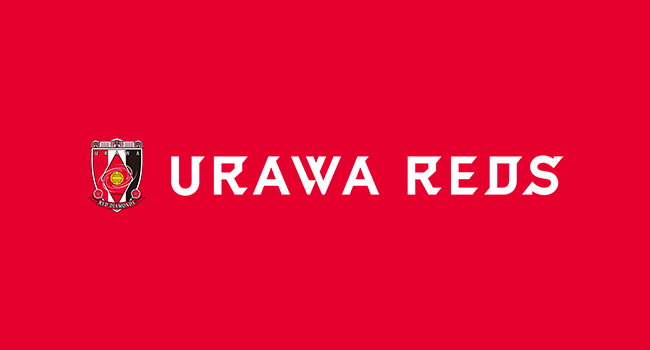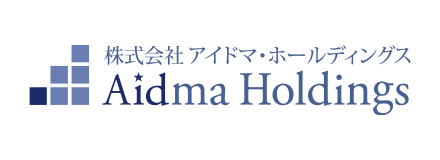NEWS
浦和レッズサポーターによる違反行為について(第十二報)(2/24修正)
16日、天皇杯 JFA 第103回全日本サッカー選手権大会 ラウンド16(4回戦)名古屋グランパス戦において発生いたしました、浦和レッズサポーターによる試合運営管理規程違反事案に関する「浦和レッズ第三者委員会公開シンポジウム」を開催いたしました。
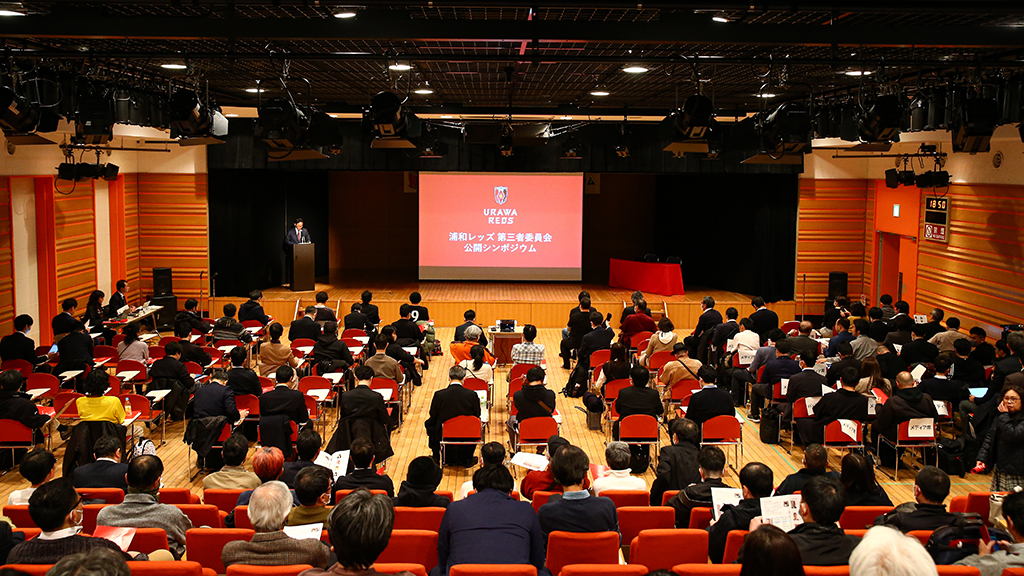
[主催者代表挨拶]
【田口 誠代表取締役社長】
「みなさま、こんばんは。浦和レッズ代表の田口です。本日はお忙しい中、本シンポジウムにご参加くださいまして、誠にありがとうございます。また、あらためまして、昨年の天皇杯において発生いたしました試合運営管理規程違反により、大変多くのみなさまにご迷惑をお掛けいたしましたことを、クラブを代表しまして心よりお詫び申し上げます。誠に申し訳ございませんでした。
本日のシンポジウムは昨年の天皇杯での事案を含めまして、過去に発生した試合運営管理規程違反事案とそれらに対する私どもの対応について、昨年11月に発足した第三者委員会のみなさまに分析いただいた結果を踏まえ、再発防止施策と教育啓発施策についてご提言をいただく場となっております。この場をお借りいたしまして、各委員のみなさまのご尽力に対しまして、心より感謝を申し上げます。
また、今回こうした公開シンポジウムという形を取らせていただいた理由についてご説明をさせていただきます。事案発生以降、私ども浦和レッズは『遅れず、隠さず、ごまかさず』という原則を徹底してまいりました。そして当然のことながら、その姿勢を最後まで貫く必要があるという考えに基づきまして、第三者委員会のみなさまのご理解のおかげもあり、本日の開催に至っております。
なお、客観性や透明性を担保するため、ご提言をいただく内容につきましては、本日この場で私どもも初めてお聞きすることになります。どのご提言に対してどのようにクラブとして実行に移していくかなどの議論は明日以降、行っていくことになりますが、文字通り第三者としての冷静かつ客観的な視点からご提言をいただけることを大変ありがたく思うとともに、謙虚に、誠実に向き合ってまいりたいと思います。それでは本日、限られた時間ではございますが、どうぞよろしくお願い申し上げます」
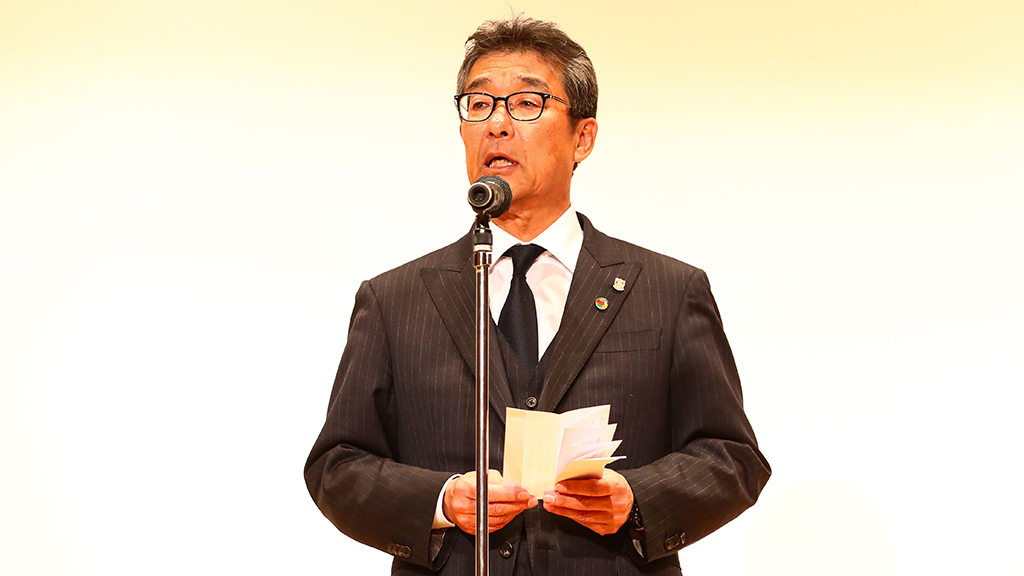
[当該事案経緯説明および事後対応等についての説明]
【清水 稔取締役副社長】
「みなさま、こんばんは。浦和レッズの清水でございます。コンプライアンス担当役員であります私より、違反事案の発生経緯、およびその後の対応についてご説明をさせていただきます。なお、第三者委員会のみなさまによるご報告、ご提言が本日の最重要議題となりますため、違反事案の重みにつきましては重々承知いたしておりますが、概略のご説明となりますことを何卒ご容赦ください。
それではまず、発生事案についてご説明させていただきます。本事案は令和5年8月2日水曜日に、天皇杯 JFA第103回全日本サッカー選手権大会 4回戦 名古屋グランパス戦が行われたCSアセット港サッカー場にて、試合終了から約20分後の21時15分ごろに発生いたしました。
当時、一部の浦和レッズサポーターと、昨シーズンまでスポーツダイレクターを務めておりました土田(尚史)、およびテクニカルダイレクターの西野(努)が浦和側ゴール裏スタンドで話し合いを行っておりました。話し合い自体は冷静に行われていたため、所轄の港署雑踏警備のみなさまはその状況を確認され、この時点でスタジアムから撤収されております。
そうした状況下で、バックスタンドへ横断幕の撤去に来ていた名古屋グランパス様のサポーター2名が浦和ゴール裏に向けて発した言葉を一部の浦和レッズサポーターが挑発と受け取り、20名ほどが憤慨し、バックスタンド側へ移動いたしました。複数名の浦和レッズサポーターが静止を試みましたが止められず、50名ほどの浦和レッズサポーターがピッチに降り、そしてバックスタンド側、名古屋エリアに侵入をいたしました。その後、浦和、名古屋、両クラブのスタッフや警備員が静止を試みましたが叶わず、後に映像で確認できた人数としては、80名の浦和レッズサポーターがバックスタンドコーナー付近まで侵入をいたしました。
そして発生から約5分後に、浦和レッズサポーターの代表者が名古屋グランパスサポーターの代表者と会話をするために名古屋側のゴール裏スタンドへ行き、徐々に落ち着きを取り戻しましたが、コーナー付近では口論が再燃するなどしていたころ、愛知県サッカー協会様から状況を伝えられた所轄の港署雑踏警備が会場へ引き返し、両サポーターの代表者同士の会話を経て収束しました。発生事案の概要は以上となります。
続いて、事後対応についてご説明をさせていただきます。試合当日、騒動の収束後にスタジアム内にて事実確認が二度にわたり行われました。一度目の事実確認は、日本サッカー協会様、Jリーグ様、愛知県サッカー協会様、名古屋グランパス様、浦和レッズ、そして両クラブサポーターの7者間で行われました。そして二度目の事実確認は日本サッカー協会様、Jリーグ様、愛知県サッカー協会様、マッチコミッショナー様、警備会社様、名古屋グランパス様、浦和レッズの7者間で行われました。
両事実確認はその時点で出席者が各々把握している情報を持ち寄り、認識を合わせていく形で行われ、物損事故が生じたことは確認されましたが、暴力行為はなかったという結論になりました。ただし、これを最終結論とはせず、後日被害届が出るなどした場合や、日本サッカー協会様が主体となり行っていく映像確認を通じて新たな事実が把握できた場合については、適正に対応していくという方針をその場で確認して終了しております。
それ以降の対応といたしましては、違反行為者への対応と弊クラブ内の取り組みの2つに注力してまいりました。まず、違反行為者への対応についてご説明いたします。試合当日の事実確認に基づき、事案発生翌日となる8月3日木曜日に入場禁止処分を含む行為者への処分を決定し、通達、発表をいたしました。そして事案発生の2日後となる8月4日金曜日に記者会見の実施を決定し、メディアのみなさまや関係各所にご案内の上、その翌日、事案発生から数えますと3日後の8月5日土曜日に記者会見を実施いたしました。
その後、日本サッカー協会様が行ってこられた映像確認に弊クラブ競技運営担当者が合流する形で、暴力行為を含む違反行為の有無やその行為者の特定等を相互で行いました。その結果確認された違反行為に対し、日本サッカー協会様による処分と合わせ、クラブ独自の処分を科すなどいたしました。具体的な行為者数とその処分といたしましては、無期限入場禁止処分対象者が22名、有期入場禁止処分対象者が31名、厳重注意処分対象者が11名の他、違反行為が確認されたものの個人特定に至っていない行為者が16名おり、計80名に上ります。なお、個人特定に至っていない違反行為者につきましては、引き続き日本サッカー協会様と連携し、特定に努めてまいります。
次に、弊クラブ内の取り組みについてご説明いたします。『違反行為に対する新たな処分基準の作成』、『処分および処分解除決定の運用プロセスの見直し』、『第三者委員会の立ち上げ』、『即時退場を含む違反行為者への適時適切かつ毅然とした対応』、『スタジアムでの禁止事項等観戦ルールの周知徹底』、『ファン・サポーターのみなさまとのコミュニケーションの再構築』という6つの施策を中心に再発防止への取り組みを進めております。本日のシンポジウムの開催もその一環ではございますが、永久入場禁止処分や損害賠償請求権の行使等を含む弊クラブ独自の処分基準の策定や、コンプライアンス委員会の新設など、すでに多くの施策が実行フェーズに入っております。引き続きこれらに限らない取り組みも含め、クラブ内外を問わず、この事案を風化させることなく、同様の事案を二度と発生させないよう、強い覚悟で取り組んでまいります。以上でございます」
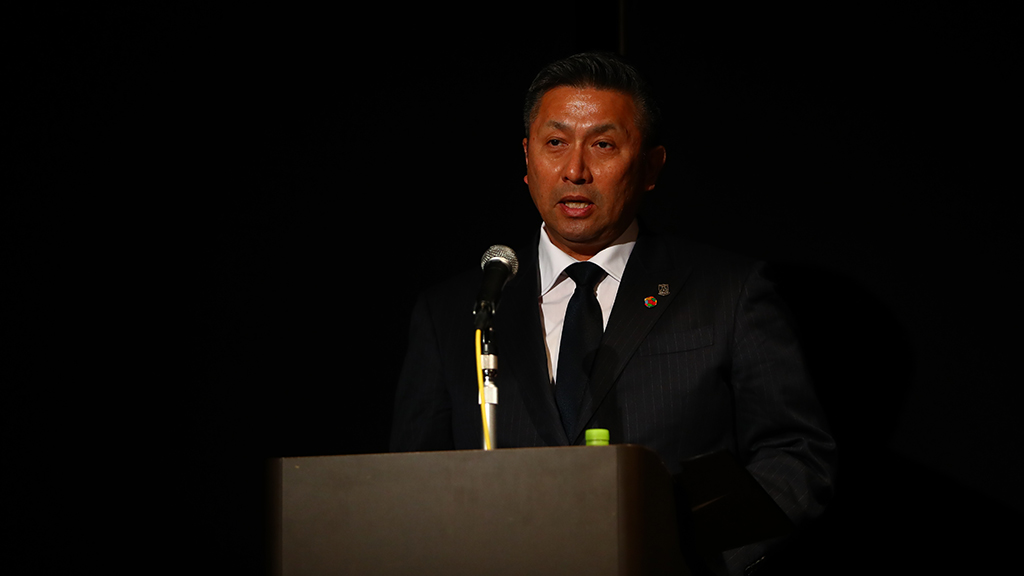
[第三者委員会のみなさまのご紹介]
委員長 一般社団法人 東京健康リハビリテーション総合研究所所長、東京大学名誉教授 武藤 芳照様
副委員長 読売新聞東京本社 編集委員 結城 和香子様
委員 日本体育大学スポーツマネジメント学部 教授 松瀬 学様
委員 筑波大学大学院人間総合科学学術院 准教授 高橋 義雄様
委員 法政大学スポーツ健康学部 教授 山本 浩様
日本女子体育大学体育学部 准教授 ヨーコ ゼッターランド様
パークス法律事務所 弁護士 望月 浩一郎様
東洋大学健康スポーツ科学部 准教授 竹村 瑞穂様
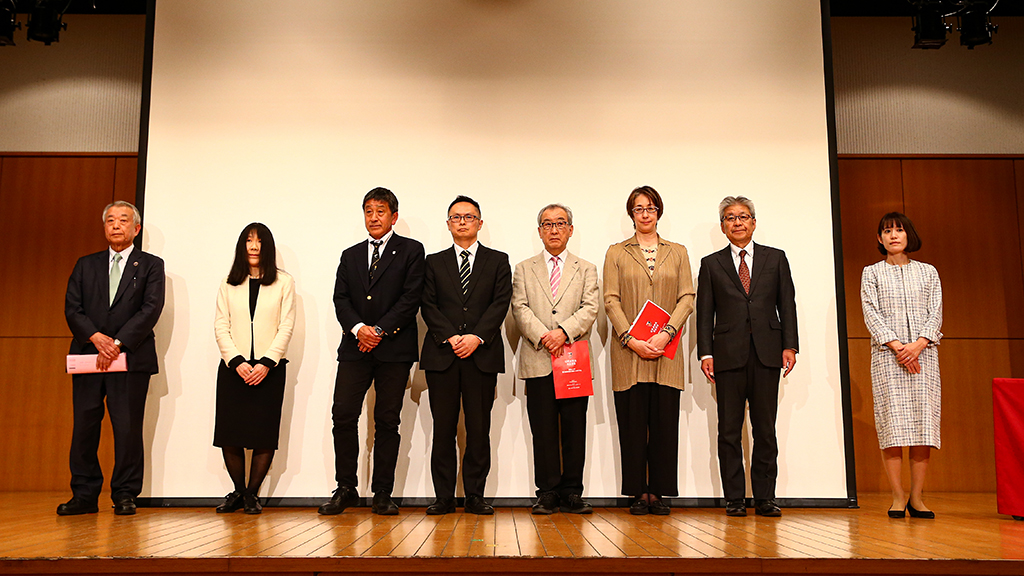
[委員長から第三者委員会の活動経過のご報告]
【武藤 芳照委員長】
「あらためまして、こんばんは。ご紹介をいただきました、今回の第三者委員会の委員長を務めております武藤でございます。昨年8月2日に名古屋で当該事案が生じたことから、浦和レッズ内に再発防止策の一環として第三者委員会が設置され、私たち8名の委員が任命されました。
11月14日の第1回の委員会から始まりまして、合計4回の会議を開催いたしました。みなで集い、議論し、作業し、本日のこのシンポジウムに至りましたが、その経緯と内容につき、委員長として報告説明をいたします。
まずは委員会の目的であります。委員会規程第2条に記載されている通り、当該事案および事案以前のクラブサポーターの違反行為に対するこれまでのクラブの対応を分析し、再発防止策とクラブおよびファン・サポーター等への教育啓発政策を検討、実施し、サッカーおよびスポーツ全体の普及振興に寄与することを目的として設置されました。
次に委員会のメンバーでございます。今、登壇しました全員でありますが、お手元のプログラムの中にもお示しをしましたように、8名の委員はそれぞれ大学の教育研究者、ジャーナリスト、弁護士、医師と多様な立場のメンバーであります。女性比率は8名中3名で37.5パーセント、副委員長は結城 和香子委員に務めていただいております。いずれも長くスポーツに関わる活動に従事してきた者ばかりでありまして、年末あるいは年度末をまたぐ4ヵ月間、基本、日本のスポーツ界がより良く発展することを願って、それぞれがこの委員を引き受け、活動をしてまいりました。
ただ、私たちは警察官でもなく、東京地検特捜部でもなく、誰かを追求したり、処罰することを目標としてはおりません。一方、日本サッカー協会規律委員会が、過去に類を見ない極めて危険かつ醜悪なものと断ぜざるを得ないような事態がなぜ起きたのかを客観的に分析し、その背景と発生要因を検討し、今後行うべき具体的対応を示す提言書および保守をまとめることを目指して活動してまいりました。
この公開シンポジウムの開催は、第1回の委員会の場で全員の合意によって決定されました。スポーツコンプライアンスの基本である、活動の公正公平、迅速、透明を保ち、先ほど田口社長がおっしゃったように、遅れず、隠さず、ごまかさずに、事後対応を図ることを重視して、各委員が準備してまいりました。
最初の委員会にて委員長に武藤、副委員長に結城委員を含め、委員会に与えられた使命を果たすべく、6名で3つのチームを形成して、それぞれの作業を分担いたしました。Aチームの松瀬、高橋両委員には不適切行為の原因分析、Bチームの山本、ゼッターランド両委員にはこれまでクラブが講じてきた対策についての評価と問題点の洗い出し、Cチームの望月、竹村両委員には、今後の必要な対策の点検検討を担当していただいて、3チームがそれぞれ短期間に精力的に活動し、その結果の概要をこの後、順次ご報告させていただきます。また、それらを踏まえて、本委員会としての浦和レッズへの提言の骨子をまとめ、それをのちほど田口 誠代表にお渡しいたします。
そして、本日のシンポジウムの概要を含めまして、委員会としての活動内容、作成いたしました図表、収集した関連資料等を編集、構成して、正式な委員会報告書を3月末日までに発刊する予定としております。それを浦和レッズにお届けするとともに、日本サッカー協会をはじめとする関係組織、団体や報道のみなさまにも配布する予定でございます。
古くより『禍福は糾える縄の如し』と言われます。良くないことと良いことは縄を結い合わせたように入れ替わり変転するものだとされております。昨年末の当該事案は、浦和レッズにとってはまさしく災いであり、間違いなく良くないことでしたが、それを契機にみんなで協力して福に切り替え、良いことが生まれるように努めることが重要と考えています。
サッカーが大好きなこの地域の子どもたちにとって、浦和レッズの活躍は誇りであり、希望であり、目標でもあります。勝つときもあれば負けるときもあります。成功もあれば失敗もあり、栄光もあれば挫折もあります。だからこそスポーツは人生の縮図と言われて、地域文化の一つとして、市民から支えられ、大切にされてきたと考えております。
私は人の健康に関わる医師の立場でもあります。私たちの体の中には、ご存知のように赤い血液が流れています。酸素を運ぶ動脈血は鮮やかな赤色、鮮紅色をしています。一方、二酸化炭素を運ぶ静脈血は暗い赤色、暗赤色をしており、両者が体内を循環して生命を保っています。浦和レッズのファン・サポーターのみなさんは、燃え上がる炎のような鮮やかな赤色に象徴される、サッカーに対する熱情と仲間意識と凛々しさを有した振る舞いを実践する存在であってほしいと強く希望しています。本日の公開シンポジウムが、浦和レッズの今後の変化に向けての道しるべとなることを願って、委員長の報告といたします。ありがとうございました」
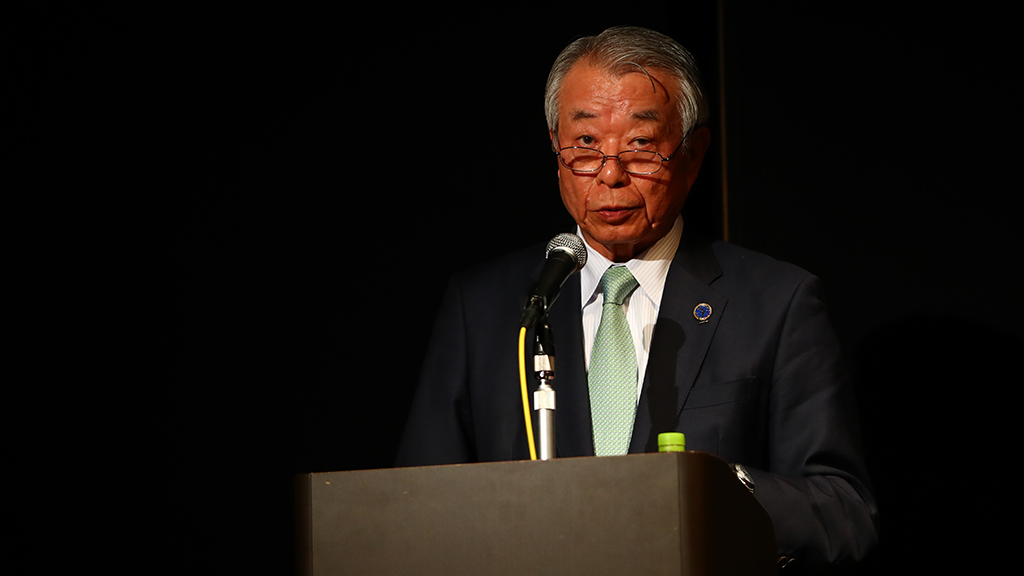
[Aチームによるご報告]
【松瀬 学委員】
「こんばんは、Aチームの松瀬です。どうぞよろしくお願いします。Aチームはトラブルの原因分析として、関係者のヒアリング分析、そして過去のトラブル事案の整理を担当しました。関係者のヒアリングは、トラブルを起こしたレッズサポーター、そしてそのサポーターを止めに行った仲間の人たち、リーダー、あるいはハードコアなレッズサポーター、その他、中学生のサッカーファン、現場の警備担当者、運営担当者、日本サッカー協会、Jリーグそしてレッズの主力選手、トータル15名、延べ18時間実施しました。その中の人の何人かは、今日ここに来られているようです。あらためてご協力に感謝します。
その膨大なインタビューシートを、AIを使った分析ソフトを使って、意味単位、意味が形成するコメントの塊として983個抽出しました。それを12個のキーワードに分類しました。ポイントはこの3つです。トラブルがなぜ起きたかの『動機』、そして『機会』、『正当化』という3つのキーワードです。
『動機』に関しては、不正行為、これを実行する主観的な事情として、いくつか共通した言葉が集まりました。圧倒的に多かったのが、名古屋のサポーターの野次、挑発発言に激怒したというコメントです。例えば、名古屋から飛んできた言葉として、『早く帰れ』あるいは『こっちにかかってこいよ』、『弱いな』、『死ね』といった言葉が来たので、それにカッとして、名古屋のサポーターの方に押しかけていったというコメントがありました。
また、レッズサポーター気質ですけど、これは熱狂的なサポーターで知られています。過剰な応援を良しとする。相手に舐められたらそれでは終わらない。売られた喧嘩は買う。そういったコメントがありまして、それがトラブルを後押ししたのではないかとこういうことが分かりました。
そして集団心理、群衆心理ですけど、1人が名古屋のサポーターの方に行ったので、みんなでついていった。中には止めに行ったサポーターもいたんですけど、それで結果的には名古屋のサポーターの方にレッズのサポーターが押しかける状況になったということです。試合は0-3で負けたんですけど、その敗戦のストレスも無関係ではないというコメントがありました。
そして『機会』です。機会というのは、不正行為の実行を容易にする客観的な環境です。これも圧倒的に多かったのが、スタジアムの構造的な問題です。会場の名古屋のアセットCS港サッカー場は普段、Jリーグの試合ではあまり使われていない名古屋市所有の小さなスタジアム。キャパシティが約2万人。そのスタジアムがJ1のチーム同士の試合としてはスペックが劣っていたのではないかというコメントがありました。そして、フェンスが低い。1メートルくらいで、簡単に乗り越えてピッチの方に行ける。あるいは緩衝エリアが小さい。横断幕が接近している。監視カメラが少ない。そういった環境がトラブルを誘発したのではないかというご指摘も多々ありました。
そして応援の制限です。普段認められている太鼓による応援が禁止であったために、レッズサポーターのストレス、イライラ、これがあったのではないかという指摘がありました。そして両チーム、両クラブの間で、チーム同士、サポーター同士のトラブルが過去にあって、この試合においては、危険な空気が試合前から漂っていたということも分かりました。
試合が終わって10分過ぎからゴール裏でクラブの強化責任者そしてレッズサポーターの方、80名から90名が対話を始めます。グラウンドの上だったので名古屋のサポーターからの挑発的な発言が聞こえてくる。そういった環境に問題があったのではないかというご意見もありました。
そして試合が8月2日水曜日夜、サポーターの中のリーダー的な立場の人が、多くは(現地へ)行けなかった。そういった環境のために、サポーター内の規律といったものがなかなかコントロールしづらかった環境もあったようです。また、コロナ禍でサポーター内部のルール、規律といったものがサポーターの中で共有しづらい環境があったというご意見もありました。
そして3つ目の『正当化』。これは不正行為の実行をやむを得ないと考える主観的な事情です。レッズのサポーターは熱狂的である。だからその中で少々荒っぽいこと、チームをとても愛している、過剰な応援もありではないかという空気もあるという指摘もありました。そして新規サポーターといいますか、最近レッズのサポーターに入ってきた人たちに対しての教育、啓発、応援するときのマナーの遵守、そういったものが徹底されていなかった環境もあることが分かりました。そしてルール、規律を軽視する。相手チームのサポーターに対するリスペクト、あるいは規律が欠如している。そういったものがどこかにあったのではないかというコメントも多々ありました。
最後にクラブとサポーターの関係性。これは、少しクラブがサポーターに甘いのではないか、なあなあの関係ではないかというご指摘もありました。主力選手の言葉、これは印象的なんですけど、『クラブ、サポーター、そして選手は共に闘う同志である。互いにリスペクトし合い、切磋琢磨して、高みを目指している同志だ』。こういったことをその主力選手は言った後に、『ただ、クラブとサポーターの関係は、親子みたいに見える』ということをおっしゃった。どういうことかというと、サポーターが規律違反を犯す、いろんなルールを破ることがあった場合に、クラブが親のように守っているように見えるという認識です。
例えば、サポーターが規律違反したことに対してクラブに罰金が出る。あるいは天皇杯出場資格剥奪。これで選手に迷惑がかかる、クラブに迷惑かかる。こういった形を捉えて、その選手はおっしゃったんだと思います。最後に、その選手が言った言葉なんですけど、天皇杯出場資格剥奪に触れて、『自分の仕事を取られた。奪われた』。そう受け止めていらっしゃいました。
中学1年生のサッカーファンは、天皇杯出場資格剥奪と聞いたときに、『レッズサポーターは何をやっているんだ。選手に迷惑を掛けないでほしい』。こういうことを口にしました。この選手、あるいは中学1年生のサッカーファンの言葉は、今回騒動を起こしたレッズサポーターにとっては、絶対に忘れてはいけない言葉だと思います」
【高橋 義雄委員】
「続きまして高橋から報告させていただきます。私が担当いたしましたのは、昨年の8月2日に起きた事案以前の事案に関して、その傾向があるかということを分析させていただきました。私たちが使いました資料は、浦和レッドダイヤモンズのクラブが所管、保有している試合管理違反に関するクラブの文書、Jリーグがインターネット等で発表している公式の発表、さらにその他のニュース等のネット情報をベースにしまして、それらをまとめて分析を行いました。そのまとめた分析の見方、指標としては、事案が発生した会場、対戦相手、事案の内容、その事案に至った原因、経過、対応、さらに処分、浦和レッドダイヤモンズの対応といった視点から分析を行っております。
事案といたしましては、1995年4月26日、大宮(公園)サッカー場、清水エスパルス戦にておきました事案を最初に、続いて2000年の4月から7月の間のアウェイゲームのさまざまな事案に対する厳重注意、2008年の事案からは処分があるんですが、5月17日のガンバ大阪戦での事案以降、計13件、最終的には8月2日の前の2022年7月2日のパナソニック スタジアム 吹田におけるガンバ大阪戦に関して、先ほど言った視点から分析をさせていただきました。
数字的に、形式的に分かること、この傾向から何が言えるかという、ある意味、仮説的なことになるかもしれません。例えば、我々が分析した13事案に関して言いますと、ホームで発生した事案とアウェイで発生した事案がほぼ均衡しているということがございました。ただ、その中でも対戦相手を見ると、ガンバ大阪が3件、清水エスパルス、ベガルタ仙台が2件と、どうも発生する試合は対戦相手にかなり偏りがあるのではないかということも分かってまいりました。
さらに発生した事案は全てではない、処分が行われてないような事案も実は発生しているのかもしれませんけれども、分析した事案でいいますと、95年に1件、2000年の4月から7月に数回起きて厳重注意、2008年から2014年の間に5件、2018年から2022年に6件と、どうも近年になって件数が増えてきているということも明らかになりました。
もう一つ重要だと思ったのは、事案が発生すると(その後発生が)なくなる時期があります。そのなくなる時期をおいてポツンとまた事案が発生するとバタバタバタっと出てくるというような傾向があります。例えば、2014年の事案はみなさんご存知だと思いますけれども、非常に大きなインパクトを与えているのだと思います。その後の2018年までの間にサポーターの自制、さらにはクラブに対する変化といったものが影響して、こうした事案が発生していないという時期も確認されております。
おそらく、このように定期的に事案が発生していてそれに対応しているのではなくて、ある一定の、おそらくマグマのように思った瞬間に発生すると、そこに対するサポーター同士の自制や抑える機能が働くことによって、一旦収まるんだけれども、あるときまたドドドっと発生する。この原因は一体何なのかってことを突き詰めないと、我々としてはですね、改善策ができないのではないのかというのは議論をさせていただきました。
私も松瀬委員と一緒にインタビューに参加するのと同時に、私が参加できなかったインタビューに関しては全てテープ起こしした文章を読ませていただきました。その中でも、事案がなくなる時期と事案が増加する時期というところと照らし合わせて考えてみると、コロナ禍の影響というのは大きいのではないかというようなことが仮説的には考えられました。つまりコロナ禍の間の声出し応援禁止に対するストレス、それらに対する反応としての事案発生、さらにサポーター同士の伝統の伝承がコロナ禍においてできていなかったのではないかというコミュニケーション不足等の影響が考えられました。
さらにクラブの対応としては、各事案が発生すると同時に何もしなかったというわけではなくて、クラブの風土、組織改正、スタッフの意識の改革等のためのさまざまな取り組みを行っていることは確認できました。それからサポーターとコミュニケーションを取ることによって、サポーターのあり方についての再構築を適宜図っていたということも我々のインタビューや資料からも読み取ることができました。
こちらの下の表にまとめたのは、見方としてはこれ行政学などが行っているガバナンス、つまり統治をする側から見たときどのような力がコントロールとして効くのかといった視点で、例えばルールの徹底や厳格化といった『法力』と言われる法によるコントロール、続いて警備を強化するような『実力』というのは力によってコントロールする警備力の強化、三つ目が経済的な誘導ということで、『財力』によってある程度コントロールするやり方。最後はコミュニケーション、これは『知力』と言われるんですけれども、基本的にクラブ側の方が圧倒的な情報を持っているわけですから、それらによってコントロールする。こうした方法に分けて、クラブがとった対応についても分析してみました。
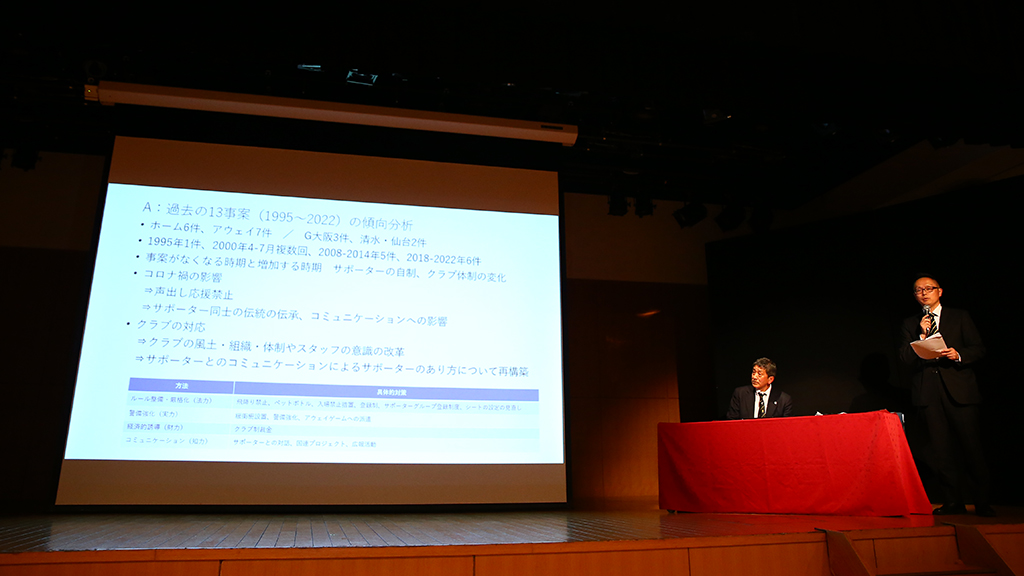
例えば、具体的な対策について言うと、ルールの厳格化という点ではまさしく最初の飛び降り禁止に始まり、ペットボトルの対応、蓋を外しなさいというような細かい対応なども、いただいた文書から確認することができました。入場禁止の措置、登録制、サポーターグループの登録制度等々、こちらはルールを変えることによって事案が発生しないようなコントロールできるのではないかという対策であったと考えられます。
『実力』的には、サポーターとサポーターの間に設置される緩衝枠の設置や、実際に警備の強化をされていることが文書上は分かっておりまして、この人数がですね、適切なかどうかっていうのは我々が判断できる範囲を超えていたんですけれども、強化はしています。アウェイゲームに関してもクラブスタッフを派遣するような形で、実力的にその存在感を示すというようなことはされております。
『財力』で言うと、クラブの制裁。こちらはですね、サポーターに対して財政的な負担を掛けるとか、このタイプ(の対応を)はとってはいませんけれども、例えば海外のサッカークラブやプロスポーツにあるように、チケットの料金をグンと上げることで、いわゆる若くて暴れそうな中途半端なサポーターが入場できないよう、経済的に誘導するようなことが海外の事例では行われていますが、それが決していいわけではなくて、どなたにもサッカーを観られるようにするには、そういった経済的な制裁によってコントロールすべきかということは議論があると思いますが、こちらについてはあまり具体的な対応が見られると言うことはできません。
コミュニケーションについては、サポーターとの対話だとか、もっと言うと国連プロジェクトを導入するような形で、知的にお互いがリスペクトし合うような形でのコントロールを考えた活動が行われていたり、広報に関してもそういった活動を行っているということがわかりました。
ただ、こうしたことがこれまでの事案の中で、書類上、事実としてはあるんだけれども、何度も続くことの原因は一体何かということを突き詰めて考えていったときに、どのような形ということがBチーム、Cチームにつながっていく話題だと思います。Aチームは以上になりますが、これまでの事案の分析と、今回関係のある方々へのヒアリングから、まずこういった事例がなぜ起きるのかっていうことを大つかみにしてみようということで、我々のチームは活動してまいりました。Aチームからの報告は以上になります。ありがとうございました」
[Bチームによるご報告]
【山本 浩委員】
「Bチームの報告をいたします。Bチームはクラブが取っていた対策についての評価と問題点の洗い出しです。すでにAチームがかなり詳しく分析をしてくれていますが、対策の評価は文言をしらみつぶしに当たり、それがどのように効果を発したかというよりも、むしろ現場で起こるさまざまな予想されるアクシデント、あるいは問題にどう対処していたかということが我々の評価をする対象になるという考えで、そこを中心にやってまいりました。
まず聞き取りと分析。我々が(聞き取りを)行いましたのは、合計8人のクラブ内の方々、クラブ外の方々です。役割に応じて長短はありますが、実際に30分から60分ほどのあらかじめ設定した質問項目による半構造化インタビューです。規定の質問をして、その中でフレームをして、新たな質問をすべき内容があったら聞くということで、一方的に聞く作業でありました。いろいろな配慮をしながら行った聞き取りの結果です。
まずその聞き取りの中に出てきた文言を取り出して、それが一体どのような問題とつながっていたのか。そこでその担当をした人、その場にいた人はどのような対応をしたのか。それが言ってみれば、対策の評価というところにつながるという考え方で行ってまいりました。
まず日常のところから見ていただきたいと思います。『熱量で浦和レッズのサポーターに勝るチームはない』というフレーズが出てきました。これに関して言いますと、熱量そのものとそれに対するあるべき行動のバランスが取れているかどうか。このあたりの判断について、幾分の偏りがあるのではないか。そんな印象を受けました。サポーターの数もクラブ側で行うことも増えている。この数年間の中で、新型コロナウイルスの影響もありましたが、さまざまな出来事がたくさんの案件として目の前にある。それに対して繁忙感と対策という意味では、クラブ内はしっかり充実できたのかという疑問が沸いてきました。
さらに、毎回資料を作成し、事前ミーティングを行っている。それは過去の不祥事に対する対応策が具体化して、そのように行動につながっていると理解していますが、これについては我々がある程度評価をしていることなんです。検証があってしっかりそれが生かされてるんですが、過去事例を含むチェックリストがあったのかどうかというと、甚だ疑問なんですね。その場その場で過去の経験を頭の中から思い出しながら、これはこうすべきじゃないか、こうすべきではないか、そういう資料を作りながらミーティングはしていたんですが、過去に起こった全てのことがチェックリストになっていたわけでは、どうやらないんですね。事前の認識、少し危険だと判断して1週間前に現場で打ち合わせ、議題は鳴り物を持ち込ませないようにするためにはどうするかと、こういうんですね。これも非常に優れた判断があったと思います。ある種の危機感があって1週間前に既に現地が赴いているわけです。ところが鳴り物に集中してしまった。横断幕に集中してしまった。そういったところがあったんですね。複数の方から『トラブルの可能性は低いと見ていた』という声がある一方で、『運営目線では間違いなくハイリスクである』という言葉が、それぞれ別の方から出ていました。つまり、危機感に違いがあったということです。そして持ち込み荷物に注意や関心が向いていた、つまり複数で同一事案にかかりきりになってしまった。言ってみれば過去の経験がそのまま非常に深く残っていたということだと思うんですね。
もう一つです。危険認識と対策。事案の発生の直前なんですが、今度は気付かぬ落とし穴ということです。現場で起きている事態は把握していた。現地で起こっていることはSNSを通じて把握していたんです。情報共有はできていたんですけど、そこで新しい展開が起こるかもしれない。新しい指示が出たのかというと、そういったところまでは届いていないんですね。
さらに、当日のサポーターと簡単なコミュニケーションを取っていた。サポーター対策はその後、変更されていたのかですね。コミュニケーションを取りながら、どうも試合の展開がよくない、このままで大丈夫かという変化に対して対応ができていたのかどうかですね。さらに鳴り物、トラメガ禁止は初めてのことである。それこそアウェイの特殊な住宅街に近いスタジアムでしたから、音を立てることに対する非常に厳しい規制があったわけですね。鳴り物、トラメガ禁止は初めて、実はクラブもトラメガを使うことができないということに気が付かないといけないですね。何か騒動が起こった、トラメガを使って『そこ静かにしてくれ』ということができないんだという条件にあったということは認識されていたかどうかなんです。
事案発生時です。内容、結果ともバッドゲーム。ストレスが膨らむ。このときにサポーターの対応に連携があったのかどうかです。さらには、クラブ強化部が出たところで所轄の警官の結集がありました。これはレッズからの報告書の中に出てきた文言で聞き取りの答えにも似たようなものがありましたが、その文言に対して、最後まで待機を要請できなかったのかどうか。
先ほど報告の中にありました、『険悪なムードではなかったので警察官は撤収した』とありましたが、私どもが聞き取りをした中では、この呼びつけるような命令口調とでも言うんでしょうか、上から目線で言う、かなり激しいやり取りがあったというのは、私どもの聞き取りの中では残っております。ですから、外から見ると静かに、もちろん暴力をするわけじゃありませんから、言葉のやり取りではありますから、警察官がそこで引き上げるときに『もうちょっと待ってくれ』と言えなかったのかどうかですね。さらに名古屋サポーターから『早く帰れ』の声があった。これも既に報告がありましたが、これについて、名古屋スタッフとのやり取りについて明快なものが残っておりません。浦和レッズの一方的な責任感、あるいはそれに対する指摘を中心に書き上げているわけですけど、これを少し特性要因図でご紹介してみたいと思います。
この特性要因図といいますのは1956年に石川馨先生、もう亡くなられましたけれども、東京大学の先生が発案されたチャートでして、製造業で起こりうる問題が原因を特定し、有効な対策を講じるための手法としてよく用いられてきていますが、潜在的な問題を見つけた手法として広く応用されています。
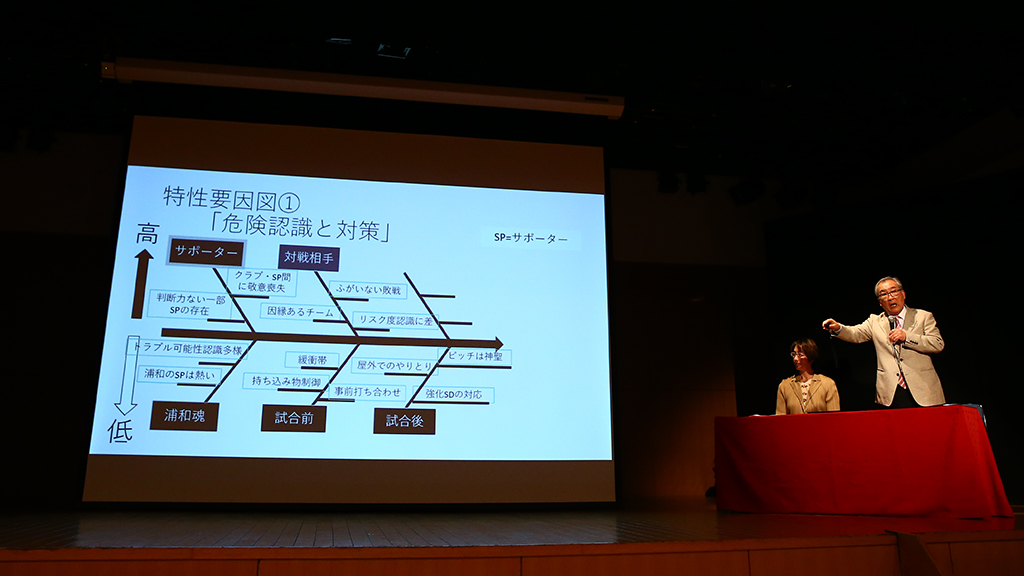
これは上の方が高い危険因子ですね。下の方に行くと少し低くなるんですが、例えばサポーター事案です。クラブとサポーターの間に敬意の喪失があったのではないか。判断力のない一部サポーターの存在があったのではないか。さらにですね、『浦和魂』という言葉ですね。浦和のサポーターは熱い、そしてトラブルの可能性の認識は多様である。つまり、熱いということそのものに批判はされないでしょうが、熱いものがどのように変化されるかというところでは、非常にこの緊迫した状態になることも想定してないといけないわけですね。
対戦相手とは因縁のあるチームという認識があった。ところがリスクの認識に差があったんですね。そこにふがいない敗戦というのが重なってしまいます。さらには試合前、事前の打ち合わせが十全にできていたのか。つまり『飛び降りるということは全く想定外であった』というふうに談話では残されているんですが、持ち込み物の制御というところに意識が偏った。一方で緩衝帯はあるにはあったけど、結果的にはそれが十分でなかったという結論に達しています。
試合後の判断。強化スポーツダイレクターの対応はどのようなものであるべきだったのか。『屋外でのやり取りでなく屋内の方が良かった』という指摘もありました。一方で『ピッチは神聖、降りるはずはない』ということを口にする方が複数ありましたが、もし降りるはずがないのであれば、埼玉スタジアムになぜあのような大きな溝とも言えるような飛び込めないような段差を作るのか。これは降りる人がいるから作っているんではないかと私には思えるんですね。
そして、スタジアムの問題。聞こえた声の挑発。多勢に無勢。こういったものが今回の発生につながってきたということが言えると思います。聞き取りの中で、『過去からその火はくすぶっていた』という言葉がありました。フェンスが高ければ何も起こらなかったんでしょうか。ファン・サポーターがそのまま静かに受け入れることができたんでしょうか。この後はゼッターランド委員の話になります」
【ヨーコ ゼッターランド委員】
「ゼッターランドです。よろしくお願いいたします。今、山本委員からの『過去からその火くすぶっていた』というところでありますと、クラブからサポーターの対策ということで、ハード面はなくてソフト面に着目をするべきなのではないかということが上がってきました。
こちらもフレーズで見るクラブからサポーターへの対策ということで、この緑のところに、これまでの流れの中で関係の変化というものがあったのではないか。そういうものが拾い上げてきた言葉の中から感じることが多々ございました。実際に案件が起こる事前のところから見てみますと、サポーターの火はくすぶっていたのではないか。積み上がってきて、いくつかの案件がずっと続いている中で、さまざまな要因がある中で、サポーターの気持ちがくすぶっていたのではないかということが先ほどからの続きになりますが、その点をクラブとしては読み取っている、感じ取っていつつも、施策をどれくらい講じていたか、講じていた際の効果はどれくらいあったのか、ということが一つ疑問として残っております。
そして『細かいルールを守らせることが必要』という言葉の中に、この周知徹底、例えばアウェイのときにはこういったルールをしっかり守ってほしい、そういったことを本当に周知徹底することができていたかどうか。あるいはその周知徹底をしていく中で、その方法が果たして本当にそれで良かったのかどうか。そういったことを再検討する必要があるのではないか。そういったことが上がってまいりました。
そして、『対面であればサポーターの感情を直に見ることができるが』という文言がございました。これはみなさんもご存知のように、コロナ禍という誰にとっても予測ができない、ただこれは多くの人にとってさまざまな環境に追い込まれたということは平等のネガティブな要素ということとして捉えられるのではないかと思います。ただその中で、これまで事案が起こってきたときに、サポーターと対面で対応してきた。その際に実際に言葉だけではなくて、感情から言葉の裏側にあるものを読み取ることができていた、あるいは言葉足らずにならずに対応ができていたということが、画面を通してではなかなかその温度感が伝わりづらいことは確かにあった。この新型コロナが及ぼしたコミュニケーションの影響がどれだけあったのか。果たしてそこだけを見てよいのか。コミュニケーションの欠落ということでは、これは多くの人にとって問題となることでもありましたので、そこだけを取り出して、特化して見るということは考える必要があるのではないかということです。
そして『パワーバランスがおかしいと感じることがある』。これは、『サポーターの方がクラブよりもパワーが大きくなる』。こういった言葉が聞かれました。これは例えばそのクラブの経営方針であったり、特に現場での強化の方針であったり、もちろんサポーターの勝ってほしい、ゲームがうまくいってほしい、ずっと見守ってきたサポーターとしてはそういうおもいが強く出るということが理解できる一方で、実際にはクラブは経営であったり、現場の強化に直接携わるということではありませんので、実質的にはそういった要望が強くなる、要望ではなくて要求に変わってくるといったときには、それが越権行為として捉えることができるのではないか。実際に要望に答える、答えないは別にして、それをそのまま受け止めるということもある種の放置、そしてそれがより一層その要求というものを助長させていくのではないかということが考えられました。
そして事案が起きた当日にどのようなコミュニケーションを取っていたか。『ゴール裏でコミュニケーションを行った』というキーワードが出てきました。これは実際にある種、これまでの流れの中で起こってきたことに関しては、しっかりとルールをサポーターが守れているかどうか。それを徹底していられるかどうか。盛り上がって感情のコントロールが難しくなっていく中で、そういったことをしっかりと現場で直接コミュニケーションを取りながらやっていこうということについて、取り組みとしては良いものが見られたということです。
ところがですね、警備態勢ですね。これは『規模等を考慮しても少ないと思った』という言葉がございました。これはアウェイでの闘いの中で、場所の条件等々いろいろ考えたときに、そしてそれまでのそれこそ『火がくすぶっている』という流れを考えたときに、何か起こる可能性があるのではないかということが実際にその対応する形として、『もしかしたら対策が十分にできていなかったのではないか』ということを警備の方で感じたという文言もありました。そうした状況を鑑みますと、予測の甘さがもしかしたらあったのではないかということが考えられます。
『ピッチは神聖。降りてこないだろう』。先ほどもそのような言葉が出てきましたが、実際に選手たちが闘う場所、そしてサッカーファン、サポーターのみなさんにとっても、そこは闘いの場である。そういった神聖な場所には、どんなに感情が高ぶっても決して降りてくるないであろうという、神聖な場所として認識している、あるいはそれに対するこのおもい、そのズレがあったのではないかということが考えられます。
試合の後、ゲームの内容としてもよくなかった、そして結果としてもよくなかった。その際に現場で『強化責任者と話したい。呼んでこい』というかなり強い要求が言葉として出てきました。実際にゲームそのものは実際に強化を担当する、あるいは現場で指揮を執る人たちが中心にやっているわけですから、こういった要求に応える、そしてその行動を取るということでいきますと、サポーターの気持ち、要望に応えるということが実質的には越権行為を容認するということになってしまっているのではないかということになっています。
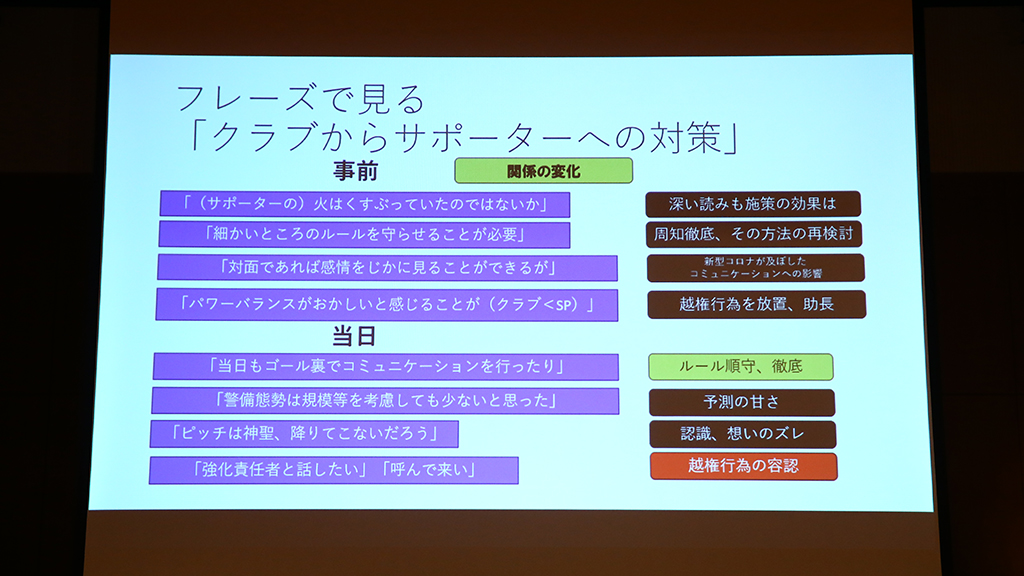
そしてこちらの特性要因図としてクラブとサポーターの関係ということで、時系列になりますが、元々スタートしたときになかなか勝てなかった時代も含めて、クラブへのサポーターの愛情、愛着がかなり強いものが浦和レッズには見られる。それが長い間醸成されてきているということが見られます。ただそのおもいが強いあまり、一部サポーターの過剰、そして過激な行為につながっていっているということが考えられます。これがいろいろな事案を引き起こす際、クラブへのペナルティーが発生するということにつながっていくということです。
続いて、チームとしてはそれに応えるという形で、サポーターへの感謝ということで捉えていますが、対等な関係、そして越権行為を助長する、あるいは2014年に『JAPANESE ONLY』の事案が起きた際にグループに世代交代があったり、それに伴ってそれまでサポートの中で自己統制があったのが継承という形になってしまった。あるいはコロナ禍の影響であったり、事案が起った際の会場の状況であったり、相手の挑発等々が一つの引き金となって、こういったさまざまなことが何とか取り組みをしようとしている中で、問題の再発そしてクラブの疲弊につながってきているということが考えられます。
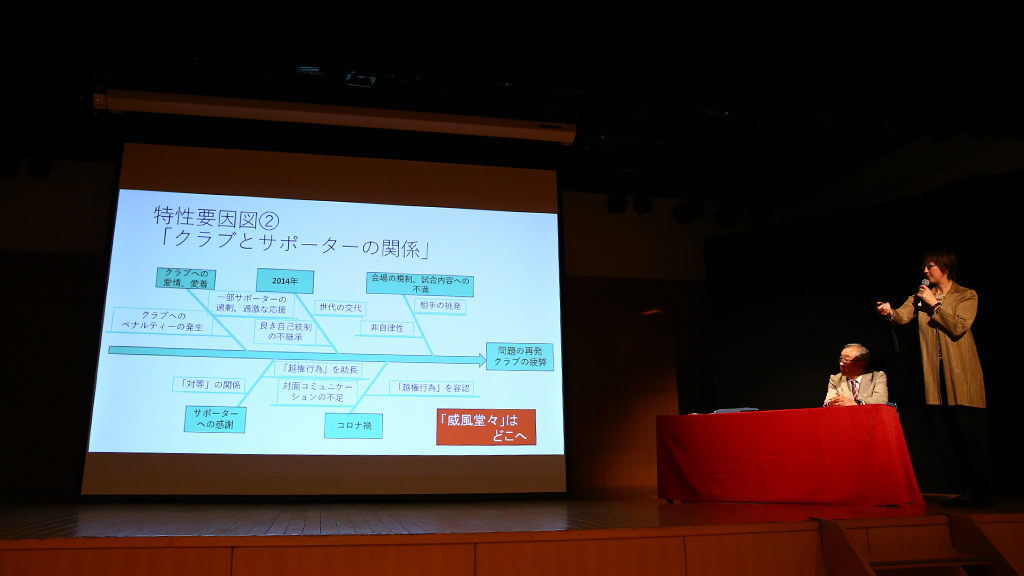
これらに対する対策とその評価、その問題点を申し上げると、長期的な評価としては、サポーターとのコミュニケーション、クラブ内、クラブ外での考え方のすり合わせ、短期的な評価としては対応策の偏り、見解の不一致、最大公約数の警戒体制、こういったものが考えられるのではないか、そういったことへの取り組みがより一層必要になってくるということがあるのではないかと思います。以上です。ありがとうございました」
[Cチームによるご報告]
【竹村 瑞穂委員】
「それではCチームの報告ですが、Aチーム、Bチームにご報告をいただきました。それを受けましてCチームではクラブに対する提言という形でお話ししていきたいと思います。大きく分けますと2つの種類に分かれます。1つは教育・啓発活動という側面、もう1つはスタジアムの環境、それから構造面、そして法的整備というハード面に関わる側面になります。
まず教育・啓発活動というところですが、なぜこの部分が重要になるのかということについて、少し触れていきたいと思います。Aチーム、Bチームの報告もありましたが、これは問題を生じさせてしまう動機に関わる要素を解消していくというところに有効なのではないかという視点になります。例えば、さまざまなきっかけがあります。相手チームの野次であったり、レッズの敗戦であったり、多様なきっかけがあるわけですが、きっかけさえあれば暴力性を肯定しかねないという意識、認識という面。そして心理面についてです。集団心理というものが働くと、内側に対しては強固なアイデンティティーが構築されていくわけですが、外側に向けては排他性であったり、攻撃性が出やすくなる。これらの要素を解消していくための取り組みの1つのアプローチとして教育・啓発活動が極めて重要な軸となると捉えております。
これまで教育・啓発活動はクラブ主導でかなり従前からさまざまな取り組みを行ってきております。例えば、オフィシャルサイト、レッズ(オフィシャル)メディアを通した観戦ルール、マナーを呼びかけること、あるいは2014年以降、サポーターミーティングも行ってきたということで、従来より多岐にわたってさまざまな取り組みを行ってきている。その点は十分に対応してきているということで評価しているところですが、プラスアルファの部分としましては、例えばガイドブックの作製と配布でしたり、とりわけ子どもたちに対する啓発イベント、こういう活動を拡充していく、あるいは試合中に何か起きた場合に通報、相談できるスタッフの配置であったり、窓口を設置するということ。これからさらなる工夫というものを、充実を図っていくことが望ましいのではないかという結論です。
もう1つは、先ほどから指摘はありましたが、クラブ、サポーター間の健全な関係性の構築というところになります。これは一般論ですが、とりわけ一般的にスポーツにおけるコアサポーターというものは、独自のアイデンティティーやイデオロギーが強固にあります。クラブ、ファン、サポーター、さまざまな集団間における上位概念としての目的を共有する必要がある。その上位概念としての目的というのは、例えばクラブ理念、こういったものをしっかりと一般コミュニティーの中で共有できるようにクラブ側が努力していく。そういう視点も重要だと思います。
レッズの理念にはどういうことがうたわれているか。オフィシャルサイトにも書かれていますが、『スポーツが日常にある文化を育み、次世代に向けて豊かな地域・社会を創っていく』。このようなことが説明されています。スポーツ、サッカーというものは文化である。文化というものは、人間の生活をより豊かにしていく、より構成していく基本的な原則、ここから逸脱することのない応援文化、これを形作っていく意識をクラブ、選手、ファン・サポーターがコミュニティーの中で共有していく。こちらも重要な点であると思います。
機会・環境に対する提言です。ファン・サポーターが問題行動を起こそうとしたときに、これを許してしまう機会要因、あるいは環境要因を解消するための取り組み、提言ということになります。こちらは先ほども少し触れましたが、ハード面に関わる部分になります。例えばスタジアムの環境や構造、運営面、あるいは規定、法的整備、このようなところになります。
こちらですが、ホームスタジアムに関する管理運営方法、こちらは既存のもので十分に工夫された措置が取られていると考えております。検討事項として挙げるならば、入場管理システムの導入というものが指摘できると思います。現在もアナログで十分に対応できているというお話で、入場禁止になった方が入場してしまうということは過去に一度も例がないとうかがっておりますので、そういったアナログで対応できる仕組みは整っているとお聞きしてはいますが、管理システムの導入に関しては検討事項として挙げたいと思います。
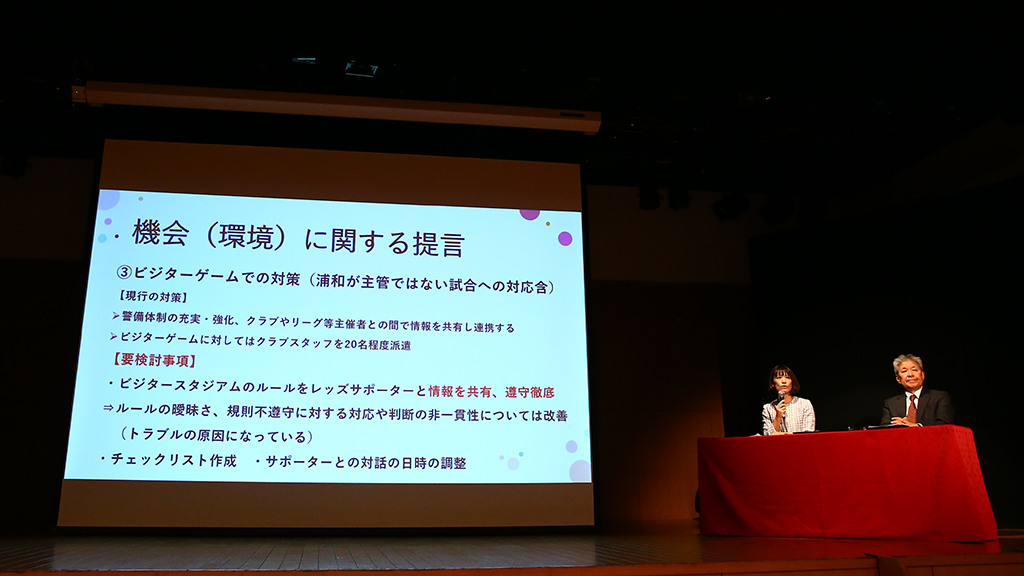
対策について検討していただきたい事項がいくつかあります。まずルールが異なるというところ、横断幕の掲出の場所であったり、方向であったり、時間帯が異なるという側面があります。まずビジタースタジアムのルールをレッズサポーターと情報を共有して遵守を徹底していく。このようなリスクマネジメントが重要になるというところ。
ルールのあいまいさ、規則不遵守の対応が一貫していない。これもトラブルの要因の一つになっていると思います。事前にそれは改善していく必要がある。ここは指摘し得るところだと考えております。先ほどBチームからも指摘がありましたが、そのために警備体制側、主催者側の意識の改善のためにも、チェックリストを作成することが重要だと思います。ホーム、ビジターにおける情報共有、連携のためにも、すぐさま取り組めるところではないかと感じております。
次に制裁制度の見直しというところになります。現行の試合運営管理規程というのは、2023年10月に改訂されております。その改訂によりまして、制裁制度を強化されています。こちらをきちんと周知徹底していくということがまず一つ、広報の充実という側面になります。
また、制裁が科された場合、その抑止効果が部分的、限定的にとどまっているということも見受けられました。問題が発生した際にどのような影響がどのような方面に与え得るのか、影響が出てしまうのか、これを可視化していく取り組み、もちろんクラブに対する経済的損失は多々、莫大なものがあると思います。ただし、金銭的な損失だけではなくて、例えばブランドイメージが損なわれてしまうということであったり、今回で言えば天皇杯に選手が出られないのみならず、それを楽しみにしていたユース世代の選手、子どもたちの機会を奪ってしまうというところまで、数値化しにくい部分も含めて、影響を見える化していくことも取り組みとして重要だと感じています。さらに懲罰制度につきましては、現行の管理規定第10条にあるわけですが、簡略なものとなっておりますので、規定の再整備が必要だという点も挙げておきたいと思います。
ここでクラブの対応についてご指摘させていただきたいと思いますが、これらを踏まえまして、これまでのさまざまな問題についてですが、第一にクラブ側のガバナンスに対する意識、対応が不十分であったということをまず認め、認識して受け入れることが第一歩であると考えております。
クラブ側としましては、安全・安心なスタジアム空間をつくる社会的責任がございますので、その点を踏まえまして、クラブ側の対応としてこれまでの話と重複する部分もありますが、あらためて述べさせていただきたいと思います。
まずクラブ側の意識改革への着手というところで、このような問題事案に取り組む場合、そしてこのような事案を発生させないために、スタッフ、選手、全体が同じ方向を向いていかなくてはいけない。考え方に相違がある形ではなく、同じ方向を向いて取り組む必要があるわけです。基本姿勢を明確にして、それを共有していく。ここは教育・啓発活動と連携して取り組んでいくことができると思います。
それからスタジアム空間における諸政の整備。この点は欠落していたところかと思いますが、法令違反事項におきましては、場合によっては警察への通報、法的対応の刑事告訴、損害賠償請求を含めて、毅然とした対応を取っていく。ここも重要な点であると思っております。
これまで述べてきたことを、実行力を持って進めていくためには、独立性の高いコンプライアンス部署の設置、そして取り組みを強化していく点も指摘したいと思います。
ここまで教育・啓発活動の部分、それからハード面に関わる部分ということで提言についてお話をさせていただきました。最後にCチームの総括ということで、望月先生から最後におまとめいただきたいと思います」
【望月 浩一郎委員】
「望月です。私はスポーツ関係の仕事が多いですが、とりわけ日本スポーツ協会、(日本)学生野球協会、高野連(日本高等学校野球連盟)、JOC(日本オリンピック委員会)、全柔連(全日本柔道連盟)、こういったところに不祥事が起こりますと、解決にあたってきた者です。スポーツにおける光と影の、影の部分をいつも見ている者でして、そのような視点からどのように解決していくか、少し意見させていただきたいと思います。
レッズのファン・サポーターは選手やクラブと共に闘い、勝利を目指す。ホームゲームはもちろん、遠いスタジアムや海外のスタジアムにも駆けつける。チームにとって非常に強い仲間であるということはレッズファンでなくても衆目の一致するところだと思います。
1993年、Jリーグ発足当時、レッズは成績が低迷し、『Jリーグのお荷物』と揶揄されるチームでした。そのチームがJリーグ発足30年で国内3大タイトルを全て獲得し、3度のAFCチャンピオンズリーグ(ACL)優勝を成し遂げさせた。これはファン・サポーターの力があってのことだと思っています。この素晴らしい歴史と実績のあるレッズサポーターは、当然2024年の天皇杯、全日本サッカー選手権での優勝を目指していたはずです。それなのに優勝を目指すどころか参加さえできない。なぜこんな結果が生じてしまったのでしょうか。天皇杯に出場できない。これは選手の出場機会を奪うことになり、選手がどれだけ痛みを受けたのか。これが分からないサポーターはいないと信じています。
レッズサポーターはメディアで『ならず者』と言われ、多くのファンやサポーターが胸を張ってレッズを応援したいと思っているのに、後ろめたさを感じる。これがサポーターの望んだことなのでしょうか。これまでもレッズには何回も制裁金が科されています。今回の問題でもスポンサー離れ、開催試合の減少、グッズの売り上げの減少、クラブに経済的ダメージがあります。このような経済的ダメージがなかったら、どれだけチームの強化ができるのか。サポーターであれば誰でも分かっていることだと思います。
レッズが好き。選手と一緒に闘うというおもいでスタジアムに来ていたサポーターなども、スタジアムに来ることすら許されないという、このような処分を望んでいたサポーターはいないはずです。それなのに、なぜ今回の問題が起こったのか。第三者委員会の調査と検討の内容は、これまで5人の委員が述べ、多岐にわたる提言が紹介されています。
最後に発言の機会を与えられた私は、ファン・サポーターに1点だけ訴えます。『ルールを守って、チームの勝利を目指す。』これをファン・サポーターとクラブの文化とすること。これを宣言して実行しませんか。
レッズはこれまでも『SPORTS FOR PEACE!』プロジェクト、サポーターミーティングの開催などで、スポーツはルールある戦いであることを共有しようと試みてきました。クラブの力不足もあり、残念ながら全てのサポーターに正しく理解されるには至らないまま、今回の問題になってしまいました。
フィールドに降りてはいけないということはみんなが知っている。しかし、やられたらやり返す。売られた喧嘩なんだから行ってやる。そういう場面になるとフィールドに降りてしまう。そういう一部サポーターの価値観。立ち入り禁止エリアには入ってはいけないというルールは当然知っている。しかし、なめられ、煽られたと思うと、それを黙って見ていることができない。そうして立ち入り禁止エリアに入る。相手チームサポーターに抗議する。そういう行動に出る一部サポーター。売られた喧嘩、なめられたという場面では、ルールを守らない行動が許容される。これが浦和レッズサポーターだという認識は正しいでしょうか。
これが今回の問題の根幹だと考えています。レッズを勝たせるためにはどうすればいいのかと考えるのが本来のサポーターです。レッズを勝たせるために、サポーターが自らの気持ちをコントロールすることがどれだけ大事なのか。
ファン・サポーターのみなさん、一緒に考え、行動しませんか。レッズサポーターは、これまでも問題を自ら解決した経験があります。かつてサポーターによるピッチへの物の投げ込みが問題になりました。今はそんな行動は見られません。どうしてか。サポーターの間で、ピッチへの物の投げ込みは選手に対する裏切り行為だという認識が共有化され、自らを律したからです。レッズサポーターは自ら問題を克服した成功体験を持っています。今回の問題も必ず克服できると信じています。
ルールを守って、チームの勝利を目指す。これをファン・サポーターとクラブの共通の文化として、共にレッズの勝利を目指しましょう。Cチームの報告は以上です」
[指定発言者の発言]
【武藤委員長】
「指定発言者による発言の場を設けました。私どもの委員会の議論の中で、委員会メンバーとは別の立場でサッカーの現場、つまり選手、コーチ、チーム、クラブの現場の立場から当該事案およびその対応について、率直にどなたかに登壇いただきたいということになりました。人選につきましては、委員会の中でそれぞれ各委員から推薦を求め、全員一致で決めていただきました。ただし、ご本人の都合もあるので、ご本人にご連絡をしてお願いしたところ、幸いにも快諾をいただきました。選手として輝かしい実績を有し、現在、浦和レッドダイヤモンズのユースコーチをお務めの阿部勇樹さんにご登壇をいただきます。どうぞよろしくお願いいたします」
【阿部 勇樹ユースコーチ】
「今ご紹介していただきました、指定発言者として参加させていただきます、阿部勇樹です。お願いします。今回の2023年8月2日のことに関して最初に聞いたときに思い出したのは、2014年の3月、横断幕の件があり、そのときは無観客試合を行いました。そのとき選手として感じたことは、誰もいないこのスタジアムでJリーグの試合をする。イメージはしていたけど、正直、ピッチに立って、普段やるトレーニングマッチなどで戦っているのかなという印象を持ちました。それと同時に、あらためて、常に多くのサポーターの方が一緒に闘ってくれている大きさを感じた無観客試合でした。
そして今回、天皇杯に出場できないという処分が下されました。この試合に負けてしまったっていうことももちろんあると思います。そして、その年の5月、ACL3度目の優勝を勝ち取りました。その結果もあり、サポーターのみなさんの期待も間違いなく大きかったと思います。その中で、敗戦はなかなか受け入れるのが難しかったんじゃないかなと思っています。
しかし、そういった問題、事案が起きたことによって、いろいろなところに影響、ダメージがあったと思います。チームに対しては経済的なダメージもあったと思います。選手への影響としては、やはり試合数が減るということは、もちろんJ1リーグがある、それだけ戦えばいい、ではなくて、浦和レッズには本当に多くの選手がいます。試合が数多くあると選手は日程的にきついかもしれませんが、若い選手の試合機会を確保するっていう意味では非常に重要な試合でした。それを考えると非常に選手にとってダメージは大きかったんじゃないかなと思っています。
そしてサポーターのみなさまにもダメージはあったと思います。日頃からこの愛する浦和レッズのチームを応援できない、その試合数が減ってしまうというのは少なからず思っていただけたんじゃないかなと思っています。
他のチームはどうか分かりません。個人の選手を応援して、その選手を引き続き、ということが多いのかもしれませんが、浦和レッズのサポーターの方は本当に浦和レッズが好きで、浦和レッズのために一緒に闘って応援してくれるという方が非常に多いと思っています。ですので、全体を考えると、みなさんが受けたダメージも本当に大きいと思います。
トップの試合、アカデミーの選手もそうですし、子どもたちは見られる機会を失ったとも思っています。アカデミーの選手からしたら、トップの選手は憧れの存在です。その機会が少なくなるのは非常に残念だなと思っています。そして今、ユースの選手を見ておりますけど、『ジュニアユースの選手、ジュニアの選手にとって、もしかしたら君たちユースの選手は憧れの存在かもしれない。だから振る舞いや、誰に見られてもおかしくない行動をしよう』という話をしています。トップの選手もアカデミーの選手に見られている。街で歩けば、サポーターの方も見ている。他のチームのサポーターの方も見ている。サッカーを離れたところでも、浦和レッズを背負って、エンブレムも背負って闘っているっていうところは自覚しなければいけません。
サポーターのみなさまはどうでしょうか。例えば、子どもたちがスタジアムに行って、みなさんの素晴らしい応援、雰囲気に憧れて、『ああ、彼らのようになりたい。俺も浦和レッズを応援したい』。そういった子どもたちは多いと思います。そういった子どもたちに本当に『俺たちのようにやってくれよ』という姿を見せているのでしょうか。もちろん数多くのサポーターは見せてくれています。そういった声も聞きます。だけど、一つのことで、そういったものが失われてしまう。みなさんが一生懸命になって積み上げてきたものがなくなってしまう。壊してしまうのはやはり簡単だと思います。
こういったことがあった後が大事ではないかと思っています。それはもちろん、クラブもそう。浦和レッズ側もこうなる前に、もっとやれたことがあるんじゃないか。今まで曖昧にしていた部分で、はっきりノーと言えなかった。それは、クラブ側の責任でもあるかなと思っています。それは現役時代も感じていました。
クラブの人は選手を守ったり、サポーターの方を守ったり、いろんなところで力を貸してくれました。逆にふがいない試合をすればサポーターの方が選手にぶつける、ため込んだものを発散させる機会がもっと必要だったのかもしれません。ふがいない試合をした後、なかなかバスが出られないというときもありました。多くの方が選手に意見をぶつけたいというおもいを持って来てくれたと思います。少し時間が経って、選手が降りて、その意見を聞く。降りても殴られることはないと思っています。サポーターのみなさんが選手たちに伝えたい、それを聞いてほしいというおもいがなかなか実現できなかった。時間がかかってしまった。それによってバスの出発も遅れて、次の日に移動があったり、お互いに解決策を見つけられずに過ごしていたと思います。
今までみなさんとこのクラブ全体で作り上げてきた、この浦和レッズが盛り上がらないと、Jリーグが盛り上がらないと思っています。こういった事案で盛り上がる、いろいろな方に知ってもらうのではなくて、元々あるこの素晴らしいクラブ、みなさんの力をもっと違った形でぶつけて進んでいかなければいけないと思っています。それにはやはり全員が、現場もそうか、会社の方もそう、もちろんサポーターの方もそう、同じ仲間として自覚していくこと、地域に活力を与える、盛り上げる、浦和を、埼玉、Jリーグを盛り上げて日本を盛り上げる。
それでアジアに行ったんですよね。みんなで。そして世界に行った。みんなが一つになったからこそ、そういったことが出せてきたわけです。僕は2021年に引退しました。その後に、浦和レッズが本当に一つになったらどんな力が出されるのかということ話をインタビューなどでさせていただきました。ACLを獲ったときなど、一つになったのかなとも思っています。でも本当の意味で、まだまだ一つになりきれていない部分があるのではないかと思っています。
サポーターのみなさんと作り上げてきたこの浦和レッズを、さらに未来へつなげていかなければいけません。次世代へしっかりつないでいくこと、それは僕たちの任務、役割なのではないかと思っています。
もちろんみなさんのパワー、浦和レッズへの気持ちは十分理解しています。それを一つの方向に向かってやっていくことは難しいですよね。だって多くの人がいるんだもん。だけど良くなるっていう目標は絶対忘れないでほしいと思います。もちろん通る道、過程は違うと思います。だけど、みなさんが目指すもの、浦和レッズの姿というものは、みんな同じだと思っているので、これからもサポーターの方とクラブと、駄目なものは駄目、仲間がミスしたら、失敗したら二度とそのミスが起きないようにサポートしてあげる。これがチームプレーだと思います。
浦和に関わる全ての方が一つになって、さらに大きくなる浦和レッズを見られる。今は周りから見ていますし、アカデミーから選手が加われるようにサポートをしていきたいと思っています。今後も浦和レッズのサポートをよろしくお願いします。ありがとうございます」
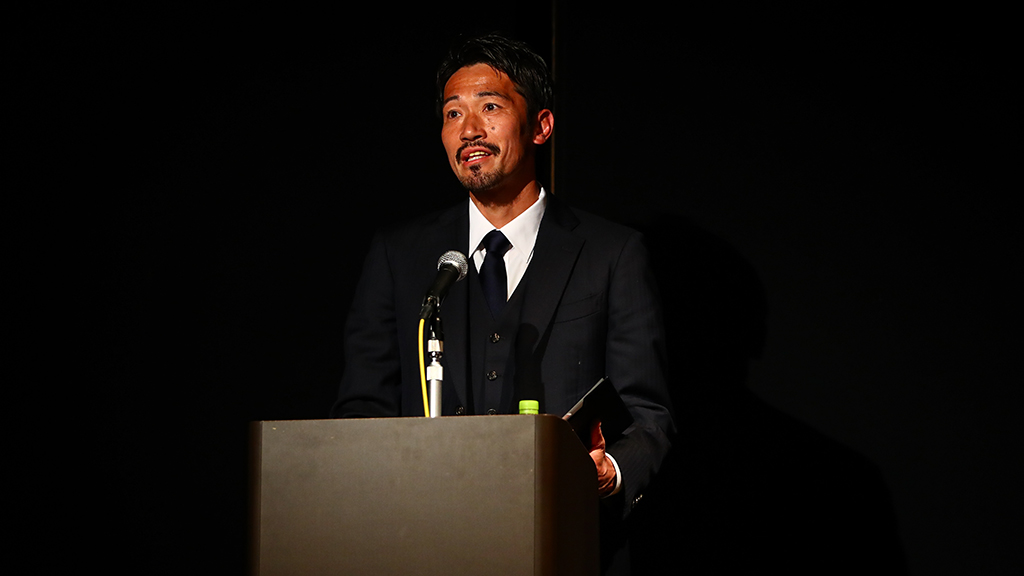
[質疑応答]
(本日はお忙しい中、大変ありがとうございました。検証させていただき、非常に鋭い分析が多くて、参加させていただいてよかったと思っています。ただ、不適切行為の原因分析の中で設備ということがありました。私も当日、名古屋に行った一人ですが、防護柵の出来の悪さ、スタジアムにすぐ入れてしまいそうな設備的にはずいぶんよくないところだと思った記憶があります。それを浦和レッズがハンドリングできたのかどうか。設備選定から警備員の数や配置などに対して浦和レッズがどこまで責任を持てたのかをお聞きしたいです)
松瀬委員
「その点は我々のヒアリングの中でも関心のポイントでありました。結論から言いますと、浦和レッズはクラブとしてその試合を直接ハンドリングする立場にはなかったということです。愛知県サッカー協会が主管としてマッチメイクというか会場を提供する、そのプロセスではやはりJ1のチーム同士試合会場としては、スペックが低すぎるのではないかという問題が起き、『どこか他に移せるのか』とかなりご苦労されましたが、結果的にはそこでやるしかなかったということです」
(ヒアリング対象が15名という話を聞きましたが、名古屋さんのサポーターさんのヒアリングはできていないのでしょうか?)
松瀬委員
「名古屋グランパスのサポーターへのヒアリングはしておりません」
(なぜでしょうか?)
「運営管理側にはしていますが、サポーター自体には今回はしておりません。それはなぜかと言われますと、時間的な問題、もしくは向こうとの接触の上で実現しなかったということです」
(山本委員にうかがいたいですが、特にクラブとサポーターの関係に関して研究があったと思いますが、今回もう少し子細に現象を見ますと、やっぱりクラブと個人個人のサポーターだけではなくて、その間に団体があると思います。この団体をどう管理するかっていうことが、長いこと浦和レッズにとっての問題になっていると感じています。例えば方策として、他のクラブでも過去数年ありますけれども、公設応援団を設置するような形で徹底的に管理するみたいな方法は可能性として考えられたのでしょうか?)
山本委員
「今回の聞き取りが終わった後、クラブの関係者にいくつか質問をしております。それについては今回は発表しておりませんが、例えばサポーターとの懇親の会議をするとか、あるいはサポーターに関する懸賞制度、つまりこれだけ我々のチームをサポートしてくださったのでありがとうという懸賞制度をするという構想はありませんかという質問をしています。ただしこれは組織としての正確な答えをいただいておりませんので、私どもとしては今ご質問をいただいたと同じような感覚、つまりクラブとしての組織と、個人のサポーターとサポーターのグループの人たちの中でのコミュニケーションに潤滑油を付けるっていう意味では、そういう機会を持つべきではないかという発想があるんですけども、それの提言はしましたが、答えは頂戴していないという状況です」
(投影されたスライドの中で長期的な評価と短期的な評価をいただきました。今回、第三者委員会として活動された中で、一番評価ができるポイントと、あとは一番問題点だと感じられたところをそれぞれ教えていただけますでしょうか?)
山本委員
「評価ができるところは、サポーターの存在というものを過去の歴史にさかのぼりながら、逐一対応しようという強い姿勢があるというところです。もう一つ評価ができないところは、そうした姿勢が主観によって決定されているというところです。機関決定や機関の中で決めた基準によって決めているのではなくて、その場に立ち至った人たちの主観的な判断によって決められているというところは幾分問題ではないかと感じています」
(Cチームの発表に登録サポーター制度というのがあったと思いますが、具体的にどういうものを考えてらっしゃるかを教えていただきたいと思います。単純に言葉の語感で言うと、自由な観戦の妨げになったり、あるいは新規のサポーターの入口を狭めてしまったりする可能性があるのではないかと危惧しています)
竹村委員
「スライドの方にこちら書かせていただきましたけれども、趣旨としましては、クラブ側がサポーターに守ってほしいルールというものをきちんと説明をして、それを同意していただくようなプロセスを重要視するという意味合いで使わせていただきました。ですので、サポーター制度という名前よりも、クラブ側はこういうことを守ってほしいということをきちんと説明をして、それに統一していただくというプロセスを重視するという意味合いで使っております」
(第三者の方々からサポーター、サポーターという言葉が何度も出られていましたが、ああいうことをした方々でもやっぱり第三者から見るとサポーターと捉えられるということをあらためて思いました。それと同時に、浦和レッズは教育機関でもないにもかかわらず、教育ですとか啓発をするということに違和感を感じました。それに対して非常に評価をされているのはオフィシャルサイトにいろいろ書かれているということでしたが、それに関してはおそらくここにいる方はほとんど見たことがなくて、クラブのユニークアクセス数がどれくらいかというと大したことがないと思っていて、そこを評価されることに違和感があります。再発防止に対して効果を考えられるのは処罰の明確化と厳罰化だと思っています。ただ、厳罰化したところで犯罪の抑止効果って非常に限定的ですよね。「自らの怒りよりもチームの勝利を優先する」とありましたが、おそらく選手もこれをやったらレッドカードをもらうよねというときも自らの怒りに任せてレッドカードをもらうようなことをしてしまうじゃないですか。それがサッカーだし、スポーツだと思っています。なので、いかに厳罰化したところでそれは起きてしまうということだと思っています。おうかがいしたいのは、そういった可能性を持つ人を排除する論理はご検討の中になかったでしょうか?)
望月委員
「どんなに厳罰化してもなくならないという部分があるのは事実ですよね。厳罰化でもなくならないという部分があるのは事実。刑法でも死刑という、命を絶たなければいけないというペナルティーがあるのが分かっていても犯してしまう方もいるわけですから。ただ、そういった制裁制度がある場合とない場合で考えていくと、ある場合の方が遥かに抑止力はあるだろうと。ゼロにはなかなかならないというか難しい。それともう一つは、怒りをコントロールするのは難しいというのは分かるけれども、コントロールしようということは言えると思うんですね。今、いろいろな社会でアンガーマネジメント、職場でも学校でもいろいろなところで言われています。私どもは、スポーツの指導者が手をあげるところの3分の1ぐらいはアンガーマネジメントの問題だろうと原因を見ています。ですから、このところはただちにゼロになるかと言われるとなかなか難しいとしか答えようがないんですが、ゼロに近づけていく努力は我々はしなければいけないんじゃないかと。そういうポジションで考えています」
(質問というか意見としてお伝えしたいことですが、最初に質問した方もまたおっしゃっていたように、浦和レッズができることと浦和レッズが直接できなかったことがそれぞれあったと思います。その点について、今日のシンポジウムを踏まえて最終報告をまとめられると思いますが、その際に浦和レッズとしてやるべきことは何なのか、浦和レッズとして直接はできないけど、協会やリーグに対してこういう働きかけはできたのではないかということを分けて提言としてまとめていただきたいです。何でもかんでも浦和レッズができなくちゃいけない、やらなくちゃいけないということになるとミスリードになるのではないかと思いましたので、その点を踏まえていただけるとありがたいです)
武藤委員長
「もちろん各競技団体もありますので、当該協議の組織だけが全てを負うことではないと理解しておりますので、報告書の段階でそのようにさせていただきたいと思います」
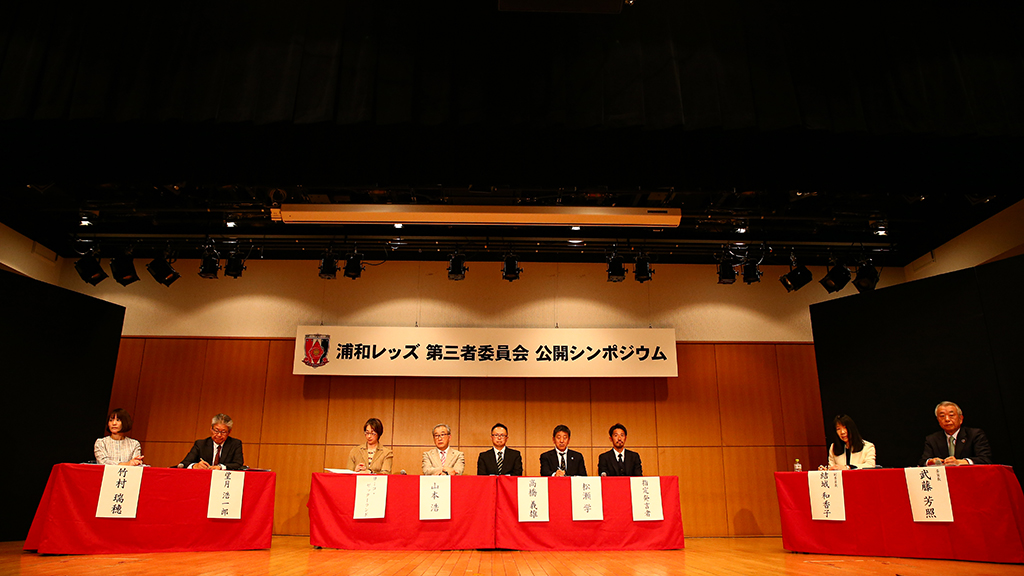
[総括]
【結城 和香子副委員長】
「本日の私どもの発表、そして阿部勇樹さんの発言をお聞きいただいて、みなさんの心になにか残していただけたでしょうか。それこそが私どもがシンポジウムを開かせていただいた一番の気持ち、伝えたいことでございます。特に阿部さんの発言の後、拍手が起きました。私もステージ袖で勝手に拍手していましたが、『ユースの選手がトップを見るように、あなたたちは次の世代のサポーターに対して自分の姿をきちんと見せよう』、または『もし失敗したら、それをカバーするのがチーム』、『難しいかもしれないけれども、変わって行こう、良くしていこう、その気持ちだけは忘れないで』。そう言っていたことをものすごく印象深く聞きました。
第三者委員会はここまでAチーム、Bチームを軸としたヒアリングなどを通して、さまざまなお声、そして状況を見てまいりました。これは去年の事象を主題として、その分析をさせていただいたのですが、それを見るためにも浦和とは一体どういう文化をお持ちなのか。それをつぶさに見たかったということも本当のところでございます。
みなさまにヒアリングさせていただいた中、一つ共通していた言葉、意見というのは、『変わらなければいけない』という思いでした。『今やっているんだけどね、でももうちょっと変わらなければいけないかな』、『いや難しいんだよ。なかなかそういうところまで抑制が効かないんだよ。昔とはね、今は違うんだよ』。そんな言い方でしたが、変わらなければいけないという声をお聞きしたのが私個人としても印象深かったということを申し上げたいです。
これまでお聞きいただいた分析、そしてこれから武藤から申し上げる提言は、みなさまの変わりたい、変わらなきゃというおもいとして、もしご自身のことではないと思っている方も、その文化を醸成するのにどうやって力を貸していこうか、そういう変化への希求意識、行動を変えていくときなのではないか、そういう認識の背を押すものです。
私どもの方で杓子定規に『これに従ってください』と言うつもりは毛頭なくて、むしろここまでいろいろやってきた、だけども第三者、もしくはさまざまな過去の知見を含めると、こういう見方もできますよ、こういう落とし穴、足りないこともあるかもしれない、もっと広い視野で何かができるかもしれない。そういうことを私どもからなるべく客観的に差し上げて、みなさまに考えていただきたい。行動を変えるきっかけにしていただきたい。それが私どもの願い、お伝えしたいことです。
浦和レッズを知ろうという中で、私も試合に何度か足を運ばせてもらいましたし、サポーターのみなさんをずっと見ていたりしました。熱量の素晴らしさ、それはみなさんおっしゃいますが、実感として印象に残っています。素晴らしい熱量を持っている。その熱量はそれを支える方々の生き方にまで関わっていくような熱量です。それがみんなを結びつける力となっていて、誇りとなって、人によってはそれが自分の掛け替えのない居場所になっている。仲間がいる。こういう非日常の体験ができる。浦和レッズというチームを自分たちがその一部となって応援する、その体感ができる。素晴らしいことだと思います。その熱情は本当に掛け替えのないものだと、私は末端ですけど実感として感じています。
私どもがお伝えしたいのは、その一番大切なものを守り続けて、次につなげるためにはどうすればいいんですか、という問いです。なんで変わらなければいけないのかと思われる方もいるかもしれない。理由として私が考えられることを2つ申し上げます。
1つはBチームのご指摘等々にもありましたが、浦和の内部で考えていた自分たちのあり方、特にサポーターとクラブの関係性、これについてそれがいいんだ、これが当たり前なんだと感じてきていたことが、どうも社会の見方とかけ離れつつある。少しずれてきているからです。難しいんですよ。ガバナンスという言葉が出てきましたね。自分や組織をどう律するかという意味だと思います。ガバナンスというのは実は、社会がどう見るか、どう考えるかによって、その規範が変わってくるものなんだそうです。
ガバナンスというものに対して、ある意味でなぜ社会がそう見るかという点に関わって申し上げると、スポーツは実は社会のさまざまな要因、社会の成熟で社会に対してより影響を与えるようになってきています。同時に、スポーツで負のことが起きると、その負の要因の影響も大きく広がります。世代を越えて、社会を越えて広がります。SNSの時代は余計にそうです。だから今は社会の批判はそれを律することを過去よりも重視し始めている。これがガバナンスの規範になっているということです。ガバナンスを考えたときに、昨年の残念なこと、そしてそれに対して与えられたペナルティー、浦和にとってはこれが一つの象徴的なものだったと考えます。
先ほどのご質問の中に、浦和の効力の中にない、よその要因もあったじゃないかということもありましたが、これまでずっと続いてきた流れを見るかぎり、どこかで何らかの形で噴出していたかもしれないと我々は見ますし、ある意味でその流れというものがクラブとサポーターのみなさま、もしくは団体との関係性やさまざまな意識、内部の意識と外部の見方の差異になりつつあるということも事実だと思います。これが1つの理由。
もう1つは、阿部勇樹さんやCチームの望月委員も言っていましたが、そういう変化がなければ、このままでは一部の方の行為がこれからの浦和のせっかくのサッカーの文化をむしばんでしまうからです。変えてしまうからです。本当にもったいないと感じます。
ヒアリングさせていただいた中で、サポーター文化を作った初期の方のお話もあった。その方は今の行為に関しては、今のサポーターが受けている自由、自由は受け取ったものも責任を持つものなんだけれども、一部の方は無責任な自由と勘違いしているのかもしれないとおっしゃっていました。もし無責任の自由というものがあるとしたら、それはいろいろな方面に影響、さまざまな負の影を落とします。選手にも落とす。サポーターご自身にも落とす。そして未来の世代にも落とすと阿部さんもおっしゃっていましたよね。そういう流れの中で、本来素晴らしいものを持っていた浦和の文化、サポーター文化、熱情というものがある意味で、次世代に伝わりにくくなるという側面が出てくることです。
Aチームのヒアリングの中で、中学1年生の方のヒアリングがあった。私もそこだけ同席させていただきましたが、その方はサッカーをしていて、選手になりたい、もしくはあのゴール裏に行って一緒に応援したい。それは強く思っている。だけども、ああいう選手に迷惑を掛ける行為は駄目だよねと言っていました。
浦和の大切なもの。その未来というものをどうやって伝えるのか。そして、将来の世代も含めたみなさんの誇りや希望、浦和のチームとサッカー文化の象徴であり続けること。それをどう守っていくのか。みなさまがどのように状況を理解し、そして自分を含めて、もしくは相手に対する言動も含めて、どのように律しようとしていくのか。それにかかっているのではないかと思います。クラブもそうですが、自ら行動を起こすことをお考えいただければと思います。これが私からの総括にならない総括ですが、第三者委員会が伝えたいこととさせていただきます。最後に第三者委員会委員長、武藤より提言の骨子をみなさんにお伝えし、クラブ側に渡したいと思います。ありがとうございます」
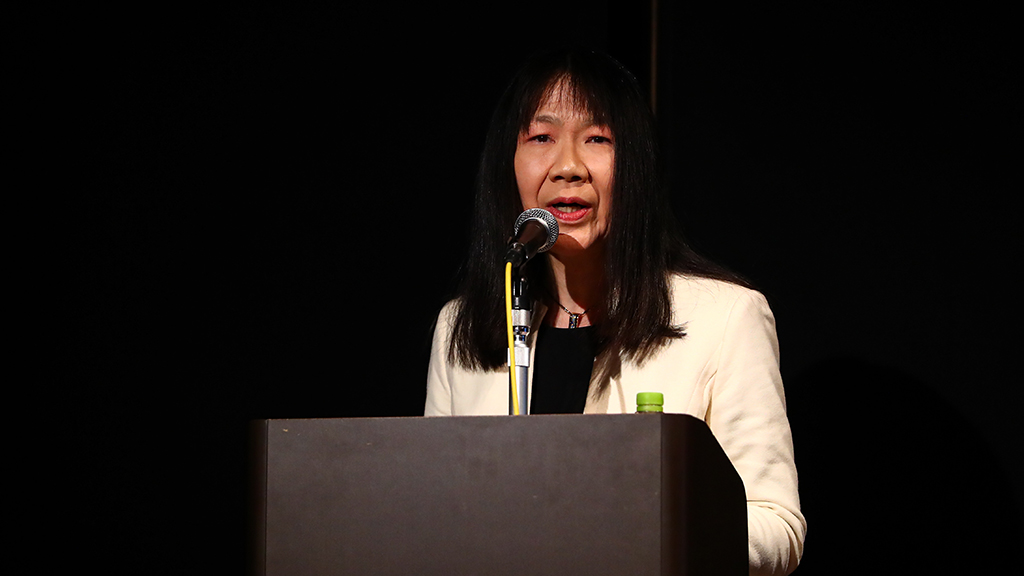
[第三者委員会からの提言]
【武藤委員長】
「浦和レッドダイヤモンズ株式会社 代表取締役 田口 誠様。浦和レッズ第三者委員会 提言の骨子。私たち8名からなる浦和レッズ第三者委員会は、2023年11月4日より審議、検討、調査、分析作業を重ね、次のように提言の骨子を集約しましたのでここにご報告します。
今後この内容に即した対応を実践、継続し、不適切行為の再発防止および未然防止に真摯に取り組むことを強く希望いたします。なお提言の詳細とその基盤となる新規検討および調査分析の結果、関係資料等については、正式な委員会報告に収載し、3月末日に発刊する予定であることを付言します。
第一。当該事案ならびに過去10数件に及ぶ違反行為の三大発生要因、すなわち動機、機会、正当化、特性要因を確認、点検し、それらを提言して同様の事態が生じないように、具体的な再発防止策および未然防止策を速やかに構築すること。
第二。マナー違反、ルール違反、法律違反とその防止に関する教育、啓発、周知広報活動の拡充とともに、それぞれの処分規定と制裁制度の整備およびルールの明確化と運用の統一を図ること。
第三。安全・安心なスタジアム空間を作り、守ることがクラブとしての社会的責務であることへの意識変革を図り、具体的な改善策を実施するとともに、選手、スタッフ等へのコンプライアンス教育啓発事業を継続すること。
第四。健全な応援文化の醸成を図り、勝利への追求や浦和を支える熱意、サポーターのアイデンティティが両立するように、ソフト面、ハード面への改善に努める。
第五。独立性の高いコンプライアンス部署を設置し、課題の整理、具体的に違反行為の防止策の立案と処分制裁のあり方を評価するとともに、クラブ内およびサポーター、ファン、地域の市民、とりわけ子どもたちへのスポーツの価値に関わる教育、啓発活動を展開すること。
第六。浦和のサッカー文化の伝統と熱情を継承しつつも、必要な意識の変革を図り、スタジアムが多様な人々の絆と誇りと力と笑顔の場所となり、それを未来へとつなげられるように尽力すること。
以上、2024年2月16日。浦和レッズ 第三者委員会委員長 武藤 芳照
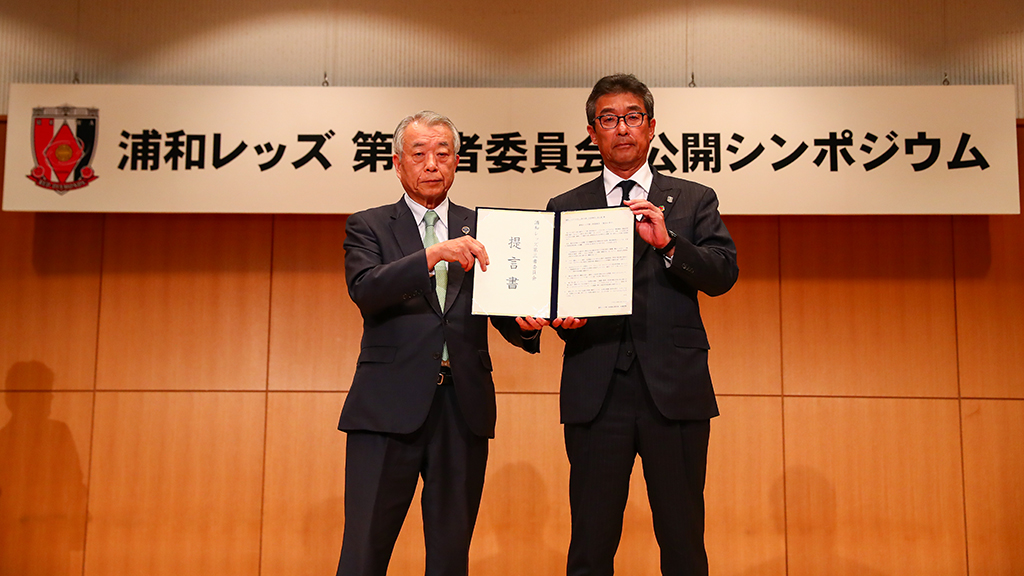
【田口代表】
「本日はありがとうございました。第三者委員会のみなさまから頂戴したご提言はもちろんのこと、本日の参加者のみなさまからいただきました、さまざまなお声に対し、誠実に向き合い、そしてファン・サポーターのみなさまとともに、安全・快適で熱気ある満員のスタジアムの実現に全力で取り組んでまいりたいとあらためて感じた次第です。浦和レッズは社会の一員であるということを強く意識し、これからも誠実にクラブ運営を行ってまいりますので、引き続きのサポートをどうぞよろしくお願いします。本日はありがとうございました」
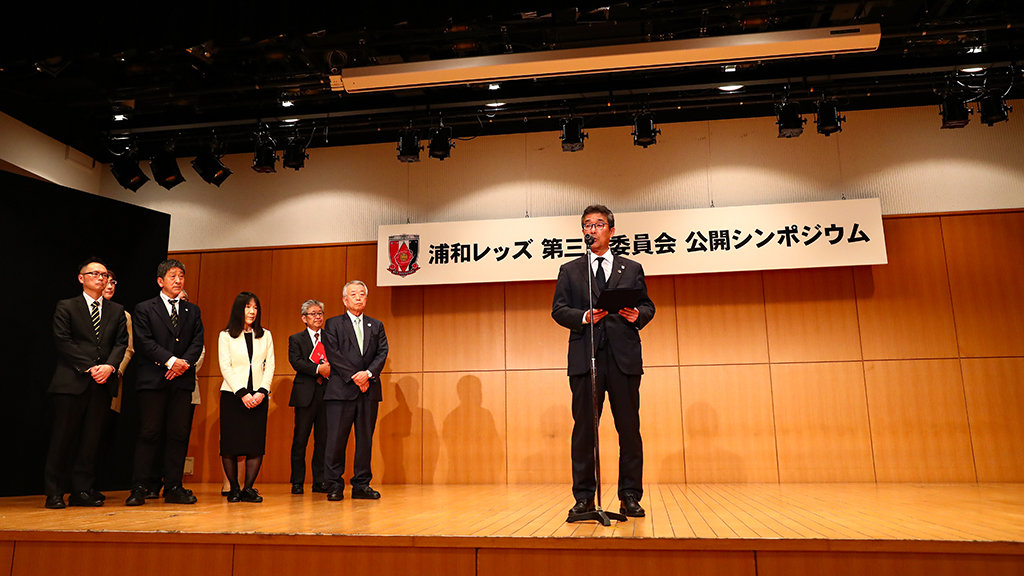
【修正履歴】
2月18日(日)に下記誤記載箇所を修正いたしました。
(1)武藤委員長による[委員長から第三者委員会の活動経過のご報告]内、Cチームの使命「提言検討」を「点検検討」へ修正。
(2)望月委員による[Cチームによるご報告] 内、「相手チームサポーターに攻撃する」を「相手チームサポーターに抗議する」へ修正。
2月19日(月)に下記誤記載箇所を修正いたしました。
(3)高橋委員による[Aチームによるご報告] 内、「保有している試合管理以外に関するクラブの文書」を「保有している試合管理違反に関するクラブの文書」へ修正。
(4)高橋委員による[Aチームによるご報告] 内、「いわゆる若くて暴れそうな中途半端にサポーターが」を「いわゆる若くて暴れそうな中途半端なサポーターが」へ修正。
2月20日(火)に下記誤記載箇所を修正いたしました。
(5)松瀬委員による[Aチームによるご報告] 内、「クラブ、サポーター、そして選手は共に闘う同士である」を「クラブ、サポーター、そして選手は共に闘う同志である」へ修正。
(6)松瀬委員による[Aチームによるご報告] 内、「高みを目指している同士だ」を「高みを目指している同志だ」へ修正。
2月24日(土)に下記誤記載箇所を修正いたしました。
(7)結城副委員長による[総括] 内、「その分析をさせていたんですが」を「その分析をさせていただいたのですが」へ修正。
(8)結城副委員長による[総括] 内、「昔はね、 今は違うんだよ」を「昔とはね、今は違うんだよ」へ修正。
(9)結城副委員長による[総括] 内、「自分や組織をどうする」を「自分や組織をどう律する」へ修正。
(10)結城副委員長による[総括] 内、「これはガバナンスの規範」を「これがガバナンスの規範」へ修正。
(11)結城副委員長による[総括] 内、「外部の見方のセオリー」を「外部の見方の差異」へ修正。

[主催者代表挨拶]
【田口 誠代表取締役社長】
「みなさま、こんばんは。浦和レッズ代表の田口です。本日はお忙しい中、本シンポジウムにご参加くださいまして、誠にありがとうございます。また、あらためまして、昨年の天皇杯において発生いたしました試合運営管理規程違反により、大変多くのみなさまにご迷惑をお掛けいたしましたことを、クラブを代表しまして心よりお詫び申し上げます。誠に申し訳ございませんでした。
本日のシンポジウムは昨年の天皇杯での事案を含めまして、過去に発生した試合運営管理規程違反事案とそれらに対する私どもの対応について、昨年11月に発足した第三者委員会のみなさまに分析いただいた結果を踏まえ、再発防止施策と教育啓発施策についてご提言をいただく場となっております。この場をお借りいたしまして、各委員のみなさまのご尽力に対しまして、心より感謝を申し上げます。
また、今回こうした公開シンポジウムという形を取らせていただいた理由についてご説明をさせていただきます。事案発生以降、私ども浦和レッズは『遅れず、隠さず、ごまかさず』という原則を徹底してまいりました。そして当然のことながら、その姿勢を最後まで貫く必要があるという考えに基づきまして、第三者委員会のみなさまのご理解のおかげもあり、本日の開催に至っております。
なお、客観性や透明性を担保するため、ご提言をいただく内容につきましては、本日この場で私どもも初めてお聞きすることになります。どのご提言に対してどのようにクラブとして実行に移していくかなどの議論は明日以降、行っていくことになりますが、文字通り第三者としての冷静かつ客観的な視点からご提言をいただけることを大変ありがたく思うとともに、謙虚に、誠実に向き合ってまいりたいと思います。それでは本日、限られた時間ではございますが、どうぞよろしくお願い申し上げます」

[当該事案経緯説明および事後対応等についての説明]
【清水 稔取締役副社長】
「みなさま、こんばんは。浦和レッズの清水でございます。コンプライアンス担当役員であります私より、違反事案の発生経緯、およびその後の対応についてご説明をさせていただきます。なお、第三者委員会のみなさまによるご報告、ご提言が本日の最重要議題となりますため、違反事案の重みにつきましては重々承知いたしておりますが、概略のご説明となりますことを何卒ご容赦ください。
それではまず、発生事案についてご説明させていただきます。本事案は令和5年8月2日水曜日に、天皇杯 JFA第103回全日本サッカー選手権大会 4回戦 名古屋グランパス戦が行われたCSアセット港サッカー場にて、試合終了から約20分後の21時15分ごろに発生いたしました。
当時、一部の浦和レッズサポーターと、昨シーズンまでスポーツダイレクターを務めておりました土田(尚史)、およびテクニカルダイレクターの西野(努)が浦和側ゴール裏スタンドで話し合いを行っておりました。話し合い自体は冷静に行われていたため、所轄の港署雑踏警備のみなさまはその状況を確認され、この時点でスタジアムから撤収されております。
そうした状況下で、バックスタンドへ横断幕の撤去に来ていた名古屋グランパス様のサポーター2名が浦和ゴール裏に向けて発した言葉を一部の浦和レッズサポーターが挑発と受け取り、20名ほどが憤慨し、バックスタンド側へ移動いたしました。複数名の浦和レッズサポーターが静止を試みましたが止められず、50名ほどの浦和レッズサポーターがピッチに降り、そしてバックスタンド側、名古屋エリアに侵入をいたしました。その後、浦和、名古屋、両クラブのスタッフや警備員が静止を試みましたが叶わず、後に映像で確認できた人数としては、80名の浦和レッズサポーターがバックスタンドコーナー付近まで侵入をいたしました。
そして発生から約5分後に、浦和レッズサポーターの代表者が名古屋グランパスサポーターの代表者と会話をするために名古屋側のゴール裏スタンドへ行き、徐々に落ち着きを取り戻しましたが、コーナー付近では口論が再燃するなどしていたころ、愛知県サッカー協会様から状況を伝えられた所轄の港署雑踏警備が会場へ引き返し、両サポーターの代表者同士の会話を経て収束しました。発生事案の概要は以上となります。
続いて、事後対応についてご説明をさせていただきます。試合当日、騒動の収束後にスタジアム内にて事実確認が二度にわたり行われました。一度目の事実確認は、日本サッカー協会様、Jリーグ様、愛知県サッカー協会様、名古屋グランパス様、浦和レッズ、そして両クラブサポーターの7者間で行われました。そして二度目の事実確認は日本サッカー協会様、Jリーグ様、愛知県サッカー協会様、マッチコミッショナー様、警備会社様、名古屋グランパス様、浦和レッズの7者間で行われました。
両事実確認はその時点で出席者が各々把握している情報を持ち寄り、認識を合わせていく形で行われ、物損事故が生じたことは確認されましたが、暴力行為はなかったという結論になりました。ただし、これを最終結論とはせず、後日被害届が出るなどした場合や、日本サッカー協会様が主体となり行っていく映像確認を通じて新たな事実が把握できた場合については、適正に対応していくという方針をその場で確認して終了しております。
それ以降の対応といたしましては、違反行為者への対応と弊クラブ内の取り組みの2つに注力してまいりました。まず、違反行為者への対応についてご説明いたします。試合当日の事実確認に基づき、事案発生翌日となる8月3日木曜日に入場禁止処分を含む行為者への処分を決定し、通達、発表をいたしました。そして事案発生の2日後となる8月4日金曜日に記者会見の実施を決定し、メディアのみなさまや関係各所にご案内の上、その翌日、事案発生から数えますと3日後の8月5日土曜日に記者会見を実施いたしました。
その後、日本サッカー協会様が行ってこられた映像確認に弊クラブ競技運営担当者が合流する形で、暴力行為を含む違反行為の有無やその行為者の特定等を相互で行いました。その結果確認された違反行為に対し、日本サッカー協会様による処分と合わせ、クラブ独自の処分を科すなどいたしました。具体的な行為者数とその処分といたしましては、無期限入場禁止処分対象者が22名、有期入場禁止処分対象者が31名、厳重注意処分対象者が11名の他、違反行為が確認されたものの個人特定に至っていない行為者が16名おり、計80名に上ります。なお、個人特定に至っていない違反行為者につきましては、引き続き日本サッカー協会様と連携し、特定に努めてまいります。
次に、弊クラブ内の取り組みについてご説明いたします。『違反行為に対する新たな処分基準の作成』、『処分および処分解除決定の運用プロセスの見直し』、『第三者委員会の立ち上げ』、『即時退場を含む違反行為者への適時適切かつ毅然とした対応』、『スタジアムでの禁止事項等観戦ルールの周知徹底』、『ファン・サポーターのみなさまとのコミュニケーションの再構築』という6つの施策を中心に再発防止への取り組みを進めております。本日のシンポジウムの開催もその一環ではございますが、永久入場禁止処分や損害賠償請求権の行使等を含む弊クラブ独自の処分基準の策定や、コンプライアンス委員会の新設など、すでに多くの施策が実行フェーズに入っております。引き続きこれらに限らない取り組みも含め、クラブ内外を問わず、この事案を風化させることなく、同様の事案を二度と発生させないよう、強い覚悟で取り組んでまいります。以上でございます」

[第三者委員会のみなさまのご紹介]
委員長 一般社団法人 東京健康リハビリテーション総合研究所所長、東京大学名誉教授 武藤 芳照様
副委員長 読売新聞東京本社 編集委員 結城 和香子様
委員 日本体育大学スポーツマネジメント学部 教授 松瀬 学様
委員 筑波大学大学院人間総合科学学術院 准教授 高橋 義雄様
委員 法政大学スポーツ健康学部 教授 山本 浩様
日本女子体育大学体育学部 准教授 ヨーコ ゼッターランド様
パークス法律事務所 弁護士 望月 浩一郎様
東洋大学健康スポーツ科学部 准教授 竹村 瑞穂様

[委員長から第三者委員会の活動経過のご報告]
【武藤 芳照委員長】
「あらためまして、こんばんは。ご紹介をいただきました、今回の第三者委員会の委員長を務めております武藤でございます。昨年8月2日に名古屋で当該事案が生じたことから、浦和レッズ内に再発防止策の一環として第三者委員会が設置され、私たち8名の委員が任命されました。
11月14日の第1回の委員会から始まりまして、合計4回の会議を開催いたしました。みなで集い、議論し、作業し、本日のこのシンポジウムに至りましたが、その経緯と内容につき、委員長として報告説明をいたします。
まずは委員会の目的であります。委員会規程第2条に記載されている通り、当該事案および事案以前のクラブサポーターの違反行為に対するこれまでのクラブの対応を分析し、再発防止策とクラブおよびファン・サポーター等への教育啓発政策を検討、実施し、サッカーおよびスポーツ全体の普及振興に寄与することを目的として設置されました。
次に委員会のメンバーでございます。今、登壇しました全員でありますが、お手元のプログラムの中にもお示しをしましたように、8名の委員はそれぞれ大学の教育研究者、ジャーナリスト、弁護士、医師と多様な立場のメンバーであります。女性比率は8名中3名で37.5パーセント、副委員長は結城 和香子委員に務めていただいております。いずれも長くスポーツに関わる活動に従事してきた者ばかりでありまして、年末あるいは年度末をまたぐ4ヵ月間、基本、日本のスポーツ界がより良く発展することを願って、それぞれがこの委員を引き受け、活動をしてまいりました。
ただ、私たちは警察官でもなく、東京地検特捜部でもなく、誰かを追求したり、処罰することを目標としてはおりません。一方、日本サッカー協会規律委員会が、過去に類を見ない極めて危険かつ醜悪なものと断ぜざるを得ないような事態がなぜ起きたのかを客観的に分析し、その背景と発生要因を検討し、今後行うべき具体的対応を示す提言書および保守をまとめることを目指して活動してまいりました。
この公開シンポジウムの開催は、第1回の委員会の場で全員の合意によって決定されました。スポーツコンプライアンスの基本である、活動の公正公平、迅速、透明を保ち、先ほど田口社長がおっしゃったように、遅れず、隠さず、ごまかさずに、事後対応を図ることを重視して、各委員が準備してまいりました。
最初の委員会にて委員長に武藤、副委員長に結城委員を含め、委員会に与えられた使命を果たすべく、6名で3つのチームを形成して、それぞれの作業を分担いたしました。Aチームの松瀬、高橋両委員には不適切行為の原因分析、Bチームの山本、ゼッターランド両委員にはこれまでクラブが講じてきた対策についての評価と問題点の洗い出し、Cチームの望月、竹村両委員には、今後の必要な対策の点検検討を担当していただいて、3チームがそれぞれ短期間に精力的に活動し、その結果の概要をこの後、順次ご報告させていただきます。また、それらを踏まえて、本委員会としての浦和レッズへの提言の骨子をまとめ、それをのちほど田口 誠代表にお渡しいたします。
そして、本日のシンポジウムの概要を含めまして、委員会としての活動内容、作成いたしました図表、収集した関連資料等を編集、構成して、正式な委員会報告書を3月末日までに発刊する予定としております。それを浦和レッズにお届けするとともに、日本サッカー協会をはじめとする関係組織、団体や報道のみなさまにも配布する予定でございます。
古くより『禍福は糾える縄の如し』と言われます。良くないことと良いことは縄を結い合わせたように入れ替わり変転するものだとされております。昨年末の当該事案は、浦和レッズにとってはまさしく災いであり、間違いなく良くないことでしたが、それを契機にみんなで協力して福に切り替え、良いことが生まれるように努めることが重要と考えています。
サッカーが大好きなこの地域の子どもたちにとって、浦和レッズの活躍は誇りであり、希望であり、目標でもあります。勝つときもあれば負けるときもあります。成功もあれば失敗もあり、栄光もあれば挫折もあります。だからこそスポーツは人生の縮図と言われて、地域文化の一つとして、市民から支えられ、大切にされてきたと考えております。
私は人の健康に関わる医師の立場でもあります。私たちの体の中には、ご存知のように赤い血液が流れています。酸素を運ぶ動脈血は鮮やかな赤色、鮮紅色をしています。一方、二酸化炭素を運ぶ静脈血は暗い赤色、暗赤色をしており、両者が体内を循環して生命を保っています。浦和レッズのファン・サポーターのみなさんは、燃え上がる炎のような鮮やかな赤色に象徴される、サッカーに対する熱情と仲間意識と凛々しさを有した振る舞いを実践する存在であってほしいと強く希望しています。本日の公開シンポジウムが、浦和レッズの今後の変化に向けての道しるべとなることを願って、委員長の報告といたします。ありがとうございました」

[Aチームによるご報告]
【松瀬 学委員】
「こんばんは、Aチームの松瀬です。どうぞよろしくお願いします。Aチームはトラブルの原因分析として、関係者のヒアリング分析、そして過去のトラブル事案の整理を担当しました。関係者のヒアリングは、トラブルを起こしたレッズサポーター、そしてそのサポーターを止めに行った仲間の人たち、リーダー、あるいはハードコアなレッズサポーター、その他、中学生のサッカーファン、現場の警備担当者、運営担当者、日本サッカー協会、Jリーグそしてレッズの主力選手、トータル15名、延べ18時間実施しました。その中の人の何人かは、今日ここに来られているようです。あらためてご協力に感謝します。
その膨大なインタビューシートを、AIを使った分析ソフトを使って、意味単位、意味が形成するコメントの塊として983個抽出しました。それを12個のキーワードに分類しました。ポイントはこの3つです。トラブルがなぜ起きたかの『動機』、そして『機会』、『正当化』という3つのキーワードです。
『動機』に関しては、不正行為、これを実行する主観的な事情として、いくつか共通した言葉が集まりました。圧倒的に多かったのが、名古屋のサポーターの野次、挑発発言に激怒したというコメントです。例えば、名古屋から飛んできた言葉として、『早く帰れ』あるいは『こっちにかかってこいよ』、『弱いな』、『死ね』といった言葉が来たので、それにカッとして、名古屋のサポーターの方に押しかけていったというコメントがありました。
また、レッズサポーター気質ですけど、これは熱狂的なサポーターで知られています。過剰な応援を良しとする。相手に舐められたらそれでは終わらない。売られた喧嘩は買う。そういったコメントがありまして、それがトラブルを後押ししたのではないかとこういうことが分かりました。
そして集団心理、群衆心理ですけど、1人が名古屋のサポーターの方に行ったので、みんなでついていった。中には止めに行ったサポーターもいたんですけど、それで結果的には名古屋のサポーターの方にレッズのサポーターが押しかける状況になったということです。試合は0-3で負けたんですけど、その敗戦のストレスも無関係ではないというコメントがありました。
そして『機会』です。機会というのは、不正行為の実行を容易にする客観的な環境です。これも圧倒的に多かったのが、スタジアムの構造的な問題です。会場の名古屋のアセットCS港サッカー場は普段、Jリーグの試合ではあまり使われていない名古屋市所有の小さなスタジアム。キャパシティが約2万人。そのスタジアムがJ1のチーム同士の試合としてはスペックが劣っていたのではないかというコメントがありました。そして、フェンスが低い。1メートルくらいで、簡単に乗り越えてピッチの方に行ける。あるいは緩衝エリアが小さい。横断幕が接近している。監視カメラが少ない。そういった環境がトラブルを誘発したのではないかというご指摘も多々ありました。
そして応援の制限です。普段認められている太鼓による応援が禁止であったために、レッズサポーターのストレス、イライラ、これがあったのではないかという指摘がありました。そして両チーム、両クラブの間で、チーム同士、サポーター同士のトラブルが過去にあって、この試合においては、危険な空気が試合前から漂っていたということも分かりました。
試合が終わって10分過ぎからゴール裏でクラブの強化責任者そしてレッズサポーターの方、80名から90名が対話を始めます。グラウンドの上だったので名古屋のサポーターからの挑発的な発言が聞こえてくる。そういった環境に問題があったのではないかというご意見もありました。
そして試合が8月2日水曜日夜、サポーターの中のリーダー的な立場の人が、多くは(現地へ)行けなかった。そういった環境のために、サポーター内の規律といったものがなかなかコントロールしづらかった環境もあったようです。また、コロナ禍でサポーター内部のルール、規律といったものがサポーターの中で共有しづらい環境があったというご意見もありました。
そして3つ目の『正当化』。これは不正行為の実行をやむを得ないと考える主観的な事情です。レッズのサポーターは熱狂的である。だからその中で少々荒っぽいこと、チームをとても愛している、過剰な応援もありではないかという空気もあるという指摘もありました。そして新規サポーターといいますか、最近レッズのサポーターに入ってきた人たちに対しての教育、啓発、応援するときのマナーの遵守、そういったものが徹底されていなかった環境もあることが分かりました。そしてルール、規律を軽視する。相手チームのサポーターに対するリスペクト、あるいは規律が欠如している。そういったものがどこかにあったのではないかというコメントも多々ありました。
最後にクラブとサポーターの関係性。これは、少しクラブがサポーターに甘いのではないか、なあなあの関係ではないかというご指摘もありました。主力選手の言葉、これは印象的なんですけど、『クラブ、サポーター、そして選手は共に闘う同志である。互いにリスペクトし合い、切磋琢磨して、高みを目指している同志だ』。こういったことをその主力選手は言った後に、『ただ、クラブとサポーターの関係は、親子みたいに見える』ということをおっしゃった。どういうことかというと、サポーターが規律違反を犯す、いろんなルールを破ることがあった場合に、クラブが親のように守っているように見えるという認識です。
例えば、サポーターが規律違反したことに対してクラブに罰金が出る。あるいは天皇杯出場資格剥奪。これで選手に迷惑がかかる、クラブに迷惑かかる。こういった形を捉えて、その選手はおっしゃったんだと思います。最後に、その選手が言った言葉なんですけど、天皇杯出場資格剥奪に触れて、『自分の仕事を取られた。奪われた』。そう受け止めていらっしゃいました。
中学1年生のサッカーファンは、天皇杯出場資格剥奪と聞いたときに、『レッズサポーターは何をやっているんだ。選手に迷惑を掛けないでほしい』。こういうことを口にしました。この選手、あるいは中学1年生のサッカーファンの言葉は、今回騒動を起こしたレッズサポーターにとっては、絶対に忘れてはいけない言葉だと思います」
【高橋 義雄委員】
「続きまして高橋から報告させていただきます。私が担当いたしましたのは、昨年の8月2日に起きた事案以前の事案に関して、その傾向があるかということを分析させていただきました。私たちが使いました資料は、浦和レッドダイヤモンズのクラブが所管、保有している試合管理違反に関するクラブの文書、Jリーグがインターネット等で発表している公式の発表、さらにその他のニュース等のネット情報をベースにしまして、それらをまとめて分析を行いました。そのまとめた分析の見方、指標としては、事案が発生した会場、対戦相手、事案の内容、その事案に至った原因、経過、対応、さらに処分、浦和レッドダイヤモンズの対応といった視点から分析を行っております。
事案といたしましては、1995年4月26日、大宮(公園)サッカー場、清水エスパルス戦にておきました事案を最初に、続いて2000年の4月から7月の間のアウェイゲームのさまざまな事案に対する厳重注意、2008年の事案からは処分があるんですが、5月17日のガンバ大阪戦での事案以降、計13件、最終的には8月2日の前の2022年7月2日のパナソニック スタジアム 吹田におけるガンバ大阪戦に関して、先ほど言った視点から分析をさせていただきました。
数字的に、形式的に分かること、この傾向から何が言えるかという、ある意味、仮説的なことになるかもしれません。例えば、我々が分析した13事案に関して言いますと、ホームで発生した事案とアウェイで発生した事案がほぼ均衡しているということがございました。ただ、その中でも対戦相手を見ると、ガンバ大阪が3件、清水エスパルス、ベガルタ仙台が2件と、どうも発生する試合は対戦相手にかなり偏りがあるのではないかということも分かってまいりました。
さらに発生した事案は全てではない、処分が行われてないような事案も実は発生しているのかもしれませんけれども、分析した事案でいいますと、95年に1件、2000年の4月から7月に数回起きて厳重注意、2008年から2014年の間に5件、2018年から2022年に6件と、どうも近年になって件数が増えてきているということも明らかになりました。
もう一つ重要だと思ったのは、事案が発生すると(その後発生が)なくなる時期があります。そのなくなる時期をおいてポツンとまた事案が発生するとバタバタバタっと出てくるというような傾向があります。例えば、2014年の事案はみなさんご存知だと思いますけれども、非常に大きなインパクトを与えているのだと思います。その後の2018年までの間にサポーターの自制、さらにはクラブに対する変化といったものが影響して、こうした事案が発生していないという時期も確認されております。
おそらく、このように定期的に事案が発生していてそれに対応しているのではなくて、ある一定の、おそらくマグマのように思った瞬間に発生すると、そこに対するサポーター同士の自制や抑える機能が働くことによって、一旦収まるんだけれども、あるときまたドドドっと発生する。この原因は一体何なのかってことを突き詰めないと、我々としてはですね、改善策ができないのではないのかというのは議論をさせていただきました。
私も松瀬委員と一緒にインタビューに参加するのと同時に、私が参加できなかったインタビューに関しては全てテープ起こしした文章を読ませていただきました。その中でも、事案がなくなる時期と事案が増加する時期というところと照らし合わせて考えてみると、コロナ禍の影響というのは大きいのではないかというようなことが仮説的には考えられました。つまりコロナ禍の間の声出し応援禁止に対するストレス、それらに対する反応としての事案発生、さらにサポーター同士の伝統の伝承がコロナ禍においてできていなかったのではないかというコミュニケーション不足等の影響が考えられました。
さらにクラブの対応としては、各事案が発生すると同時に何もしなかったというわけではなくて、クラブの風土、組織改正、スタッフの意識の改革等のためのさまざまな取り組みを行っていることは確認できました。それからサポーターとコミュニケーションを取ることによって、サポーターのあり方についての再構築を適宜図っていたということも我々のインタビューや資料からも読み取ることができました。
こちらの下の表にまとめたのは、見方としてはこれ行政学などが行っているガバナンス、つまり統治をする側から見たときどのような力がコントロールとして効くのかといった視点で、例えばルールの徹底や厳格化といった『法力』と言われる法によるコントロール、続いて警備を強化するような『実力』というのは力によってコントロールする警備力の強化、三つ目が経済的な誘導ということで、『財力』によってある程度コントロールするやり方。最後はコミュニケーション、これは『知力』と言われるんですけれども、基本的にクラブ側の方が圧倒的な情報を持っているわけですから、それらによってコントロールする。こうした方法に分けて、クラブがとった対応についても分析してみました。

例えば、具体的な対策について言うと、ルールの厳格化という点ではまさしく最初の飛び降り禁止に始まり、ペットボトルの対応、蓋を外しなさいというような細かい対応なども、いただいた文書から確認することができました。入場禁止の措置、登録制、サポーターグループの登録制度等々、こちらはルールを変えることによって事案が発生しないようなコントロールできるのではないかという対策であったと考えられます。
『実力』的には、サポーターとサポーターの間に設置される緩衝枠の設置や、実際に警備の強化をされていることが文書上は分かっておりまして、この人数がですね、適切なかどうかっていうのは我々が判断できる範囲を超えていたんですけれども、強化はしています。アウェイゲームに関してもクラブスタッフを派遣するような形で、実力的にその存在感を示すというようなことはされております。
『財力』で言うと、クラブの制裁。こちらはですね、サポーターに対して財政的な負担を掛けるとか、このタイプ(の対応を)はとってはいませんけれども、例えば海外のサッカークラブやプロスポーツにあるように、チケットの料金をグンと上げることで、いわゆる若くて暴れそうな中途半端なサポーターが入場できないよう、経済的に誘導するようなことが海外の事例では行われていますが、それが決していいわけではなくて、どなたにもサッカーを観られるようにするには、そういった経済的な制裁によってコントロールすべきかということは議論があると思いますが、こちらについてはあまり具体的な対応が見られると言うことはできません。
コミュニケーションについては、サポーターとの対話だとか、もっと言うと国連プロジェクトを導入するような形で、知的にお互いがリスペクトし合うような形でのコントロールを考えた活動が行われていたり、広報に関してもそういった活動を行っているということがわかりました。
ただ、こうしたことがこれまでの事案の中で、書類上、事実としてはあるんだけれども、何度も続くことの原因は一体何かということを突き詰めて考えていったときに、どのような形ということがBチーム、Cチームにつながっていく話題だと思います。Aチームは以上になりますが、これまでの事案の分析と、今回関係のある方々へのヒアリングから、まずこういった事例がなぜ起きるのかっていうことを大つかみにしてみようということで、我々のチームは活動してまいりました。Aチームからの報告は以上になります。ありがとうございました」
[Bチームによるご報告]
【山本 浩委員】
「Bチームの報告をいたします。Bチームはクラブが取っていた対策についての評価と問題点の洗い出しです。すでにAチームがかなり詳しく分析をしてくれていますが、対策の評価は文言をしらみつぶしに当たり、それがどのように効果を発したかというよりも、むしろ現場で起こるさまざまな予想されるアクシデント、あるいは問題にどう対処していたかということが我々の評価をする対象になるという考えで、そこを中心にやってまいりました。
まず聞き取りと分析。我々が(聞き取りを)行いましたのは、合計8人のクラブ内の方々、クラブ外の方々です。役割に応じて長短はありますが、実際に30分から60分ほどのあらかじめ設定した質問項目による半構造化インタビューです。規定の質問をして、その中でフレームをして、新たな質問をすべき内容があったら聞くということで、一方的に聞く作業でありました。いろいろな配慮をしながら行った聞き取りの結果です。
まずその聞き取りの中に出てきた文言を取り出して、それが一体どのような問題とつながっていたのか。そこでその担当をした人、その場にいた人はどのような対応をしたのか。それが言ってみれば、対策の評価というところにつながるという考え方で行ってまいりました。
まず日常のところから見ていただきたいと思います。『熱量で浦和レッズのサポーターに勝るチームはない』というフレーズが出てきました。これに関して言いますと、熱量そのものとそれに対するあるべき行動のバランスが取れているかどうか。このあたりの判断について、幾分の偏りがあるのではないか。そんな印象を受けました。サポーターの数もクラブ側で行うことも増えている。この数年間の中で、新型コロナウイルスの影響もありましたが、さまざまな出来事がたくさんの案件として目の前にある。それに対して繁忙感と対策という意味では、クラブ内はしっかり充実できたのかという疑問が沸いてきました。
さらに、毎回資料を作成し、事前ミーティングを行っている。それは過去の不祥事に対する対応策が具体化して、そのように行動につながっていると理解していますが、これについては我々がある程度評価をしていることなんです。検証があってしっかりそれが生かされてるんですが、過去事例を含むチェックリストがあったのかどうかというと、甚だ疑問なんですね。その場その場で過去の経験を頭の中から思い出しながら、これはこうすべきじゃないか、こうすべきではないか、そういう資料を作りながらミーティングはしていたんですが、過去に起こった全てのことがチェックリストになっていたわけでは、どうやらないんですね。事前の認識、少し危険だと判断して1週間前に現場で打ち合わせ、議題は鳴り物を持ち込ませないようにするためにはどうするかと、こういうんですね。これも非常に優れた判断があったと思います。ある種の危機感があって1週間前に既に現地が赴いているわけです。ところが鳴り物に集中してしまった。横断幕に集中してしまった。そういったところがあったんですね。複数の方から『トラブルの可能性は低いと見ていた』という声がある一方で、『運営目線では間違いなくハイリスクである』という言葉が、それぞれ別の方から出ていました。つまり、危機感に違いがあったということです。そして持ち込み荷物に注意や関心が向いていた、つまり複数で同一事案にかかりきりになってしまった。言ってみれば過去の経験がそのまま非常に深く残っていたということだと思うんですね。
もう一つです。危険認識と対策。事案の発生の直前なんですが、今度は気付かぬ落とし穴ということです。現場で起きている事態は把握していた。現地で起こっていることはSNSを通じて把握していたんです。情報共有はできていたんですけど、そこで新しい展開が起こるかもしれない。新しい指示が出たのかというと、そういったところまでは届いていないんですね。
さらに、当日のサポーターと簡単なコミュニケーションを取っていた。サポーター対策はその後、変更されていたのかですね。コミュニケーションを取りながら、どうも試合の展開がよくない、このままで大丈夫かという変化に対して対応ができていたのかどうかですね。さらに鳴り物、トラメガ禁止は初めてのことである。それこそアウェイの特殊な住宅街に近いスタジアムでしたから、音を立てることに対する非常に厳しい規制があったわけですね。鳴り物、トラメガ禁止は初めて、実はクラブもトラメガを使うことができないということに気が付かないといけないですね。何か騒動が起こった、トラメガを使って『そこ静かにしてくれ』ということができないんだという条件にあったということは認識されていたかどうかなんです。
事案発生時です。内容、結果ともバッドゲーム。ストレスが膨らむ。このときにサポーターの対応に連携があったのかどうかです。さらには、クラブ強化部が出たところで所轄の警官の結集がありました。これはレッズからの報告書の中に出てきた文言で聞き取りの答えにも似たようなものがありましたが、その文言に対して、最後まで待機を要請できなかったのかどうか。
先ほど報告の中にありました、『険悪なムードではなかったので警察官は撤収した』とありましたが、私どもが聞き取りをした中では、この呼びつけるような命令口調とでも言うんでしょうか、上から目線で言う、かなり激しいやり取りがあったというのは、私どもの聞き取りの中では残っております。ですから、外から見ると静かに、もちろん暴力をするわけじゃありませんから、言葉のやり取りではありますから、警察官がそこで引き上げるときに『もうちょっと待ってくれ』と言えなかったのかどうかですね。さらに名古屋サポーターから『早く帰れ』の声があった。これも既に報告がありましたが、これについて、名古屋スタッフとのやり取りについて明快なものが残っておりません。浦和レッズの一方的な責任感、あるいはそれに対する指摘を中心に書き上げているわけですけど、これを少し特性要因図でご紹介してみたいと思います。
この特性要因図といいますのは1956年に石川馨先生、もう亡くなられましたけれども、東京大学の先生が発案されたチャートでして、製造業で起こりうる問題が原因を特定し、有効な対策を講じるための手法としてよく用いられてきていますが、潜在的な問題を見つけた手法として広く応用されています。

これは上の方が高い危険因子ですね。下の方に行くと少し低くなるんですが、例えばサポーター事案です。クラブとサポーターの間に敬意の喪失があったのではないか。判断力のない一部サポーターの存在があったのではないか。さらにですね、『浦和魂』という言葉ですね。浦和のサポーターは熱い、そしてトラブルの可能性の認識は多様である。つまり、熱いということそのものに批判はされないでしょうが、熱いものがどのように変化されるかというところでは、非常にこの緊迫した状態になることも想定してないといけないわけですね。
対戦相手とは因縁のあるチームという認識があった。ところがリスクの認識に差があったんですね。そこにふがいない敗戦というのが重なってしまいます。さらには試合前、事前の打ち合わせが十全にできていたのか。つまり『飛び降りるということは全く想定外であった』というふうに談話では残されているんですが、持ち込み物の制御というところに意識が偏った。一方で緩衝帯はあるにはあったけど、結果的にはそれが十分でなかったという結論に達しています。
試合後の判断。強化スポーツダイレクターの対応はどのようなものであるべきだったのか。『屋外でのやり取りでなく屋内の方が良かった』という指摘もありました。一方で『ピッチは神聖、降りるはずはない』ということを口にする方が複数ありましたが、もし降りるはずがないのであれば、埼玉スタジアムになぜあのような大きな溝とも言えるような飛び込めないような段差を作るのか。これは降りる人がいるから作っているんではないかと私には思えるんですね。
そして、スタジアムの問題。聞こえた声の挑発。多勢に無勢。こういったものが今回の発生につながってきたということが言えると思います。聞き取りの中で、『過去からその火はくすぶっていた』という言葉がありました。フェンスが高ければ何も起こらなかったんでしょうか。ファン・サポーターがそのまま静かに受け入れることができたんでしょうか。この後はゼッターランド委員の話になります」
【ヨーコ ゼッターランド委員】
「ゼッターランドです。よろしくお願いいたします。今、山本委員からの『過去からその火くすぶっていた』というところでありますと、クラブからサポーターの対策ということで、ハード面はなくてソフト面に着目をするべきなのではないかということが上がってきました。
こちらもフレーズで見るクラブからサポーターへの対策ということで、この緑のところに、これまでの流れの中で関係の変化というものがあったのではないか。そういうものが拾い上げてきた言葉の中から感じることが多々ございました。実際に案件が起こる事前のところから見てみますと、サポーターの火はくすぶっていたのではないか。積み上がってきて、いくつかの案件がずっと続いている中で、さまざまな要因がある中で、サポーターの気持ちがくすぶっていたのではないかということが先ほどからの続きになりますが、その点をクラブとしては読み取っている、感じ取っていつつも、施策をどれくらい講じていたか、講じていた際の効果はどれくらいあったのか、ということが一つ疑問として残っております。
そして『細かいルールを守らせることが必要』という言葉の中に、この周知徹底、例えばアウェイのときにはこういったルールをしっかり守ってほしい、そういったことを本当に周知徹底することができていたかどうか。あるいはその周知徹底をしていく中で、その方法が果たして本当にそれで良かったのかどうか。そういったことを再検討する必要があるのではないか。そういったことが上がってまいりました。
そして、『対面であればサポーターの感情を直に見ることができるが』という文言がございました。これはみなさんもご存知のように、コロナ禍という誰にとっても予測ができない、ただこれは多くの人にとってさまざまな環境に追い込まれたということは平等のネガティブな要素ということとして捉えられるのではないかと思います。ただその中で、これまで事案が起こってきたときに、サポーターと対面で対応してきた。その際に実際に言葉だけではなくて、感情から言葉の裏側にあるものを読み取ることができていた、あるいは言葉足らずにならずに対応ができていたということが、画面を通してではなかなかその温度感が伝わりづらいことは確かにあった。この新型コロナが及ぼしたコミュニケーションの影響がどれだけあったのか。果たしてそこだけを見てよいのか。コミュニケーションの欠落ということでは、これは多くの人にとって問題となることでもありましたので、そこだけを取り出して、特化して見るということは考える必要があるのではないかということです。
そして『パワーバランスがおかしいと感じることがある』。これは、『サポーターの方がクラブよりもパワーが大きくなる』。こういった言葉が聞かれました。これは例えばそのクラブの経営方針であったり、特に現場での強化の方針であったり、もちろんサポーターの勝ってほしい、ゲームがうまくいってほしい、ずっと見守ってきたサポーターとしてはそういうおもいが強く出るということが理解できる一方で、実際にはクラブは経営であったり、現場の強化に直接携わるということではありませんので、実質的にはそういった要望が強くなる、要望ではなくて要求に変わってくるといったときには、それが越権行為として捉えることができるのではないか。実際に要望に答える、答えないは別にして、それをそのまま受け止めるということもある種の放置、そしてそれがより一層その要求というものを助長させていくのではないかということが考えられました。
そして事案が起きた当日にどのようなコミュニケーションを取っていたか。『ゴール裏でコミュニケーションを行った』というキーワードが出てきました。これは実際にある種、これまでの流れの中で起こってきたことに関しては、しっかりとルールをサポーターが守れているかどうか。それを徹底していられるかどうか。盛り上がって感情のコントロールが難しくなっていく中で、そういったことをしっかりと現場で直接コミュニケーションを取りながらやっていこうということについて、取り組みとしては良いものが見られたということです。
ところがですね、警備態勢ですね。これは『規模等を考慮しても少ないと思った』という言葉がございました。これはアウェイでの闘いの中で、場所の条件等々いろいろ考えたときに、そしてそれまでのそれこそ『火がくすぶっている』という流れを考えたときに、何か起こる可能性があるのではないかということが実際にその対応する形として、『もしかしたら対策が十分にできていなかったのではないか』ということを警備の方で感じたという文言もありました。そうした状況を鑑みますと、予測の甘さがもしかしたらあったのではないかということが考えられます。
『ピッチは神聖。降りてこないだろう』。先ほどもそのような言葉が出てきましたが、実際に選手たちが闘う場所、そしてサッカーファン、サポーターのみなさんにとっても、そこは闘いの場である。そういった神聖な場所には、どんなに感情が高ぶっても決して降りてくるないであろうという、神聖な場所として認識している、あるいはそれに対するこのおもい、そのズレがあったのではないかということが考えられます。
試合の後、ゲームの内容としてもよくなかった、そして結果としてもよくなかった。その際に現場で『強化責任者と話したい。呼んでこい』というかなり強い要求が言葉として出てきました。実際にゲームそのものは実際に強化を担当する、あるいは現場で指揮を執る人たちが中心にやっているわけですから、こういった要求に応える、そしてその行動を取るということでいきますと、サポーターの気持ち、要望に応えるということが実質的には越権行為を容認するということになってしまっているのではないかということになっています。

そしてこちらの特性要因図としてクラブとサポーターの関係ということで、時系列になりますが、元々スタートしたときになかなか勝てなかった時代も含めて、クラブへのサポーターの愛情、愛着がかなり強いものが浦和レッズには見られる。それが長い間醸成されてきているということが見られます。ただそのおもいが強いあまり、一部サポーターの過剰、そして過激な行為につながっていっているということが考えられます。これがいろいろな事案を引き起こす際、クラブへのペナルティーが発生するということにつながっていくということです。
続いて、チームとしてはそれに応えるという形で、サポーターへの感謝ということで捉えていますが、対等な関係、そして越権行為を助長する、あるいは2014年に『JAPANESE ONLY』の事案が起きた際にグループに世代交代があったり、それに伴ってそれまでサポートの中で自己統制があったのが継承という形になってしまった。あるいはコロナ禍の影響であったり、事案が起った際の会場の状況であったり、相手の挑発等々が一つの引き金となって、こういったさまざまなことが何とか取り組みをしようとしている中で、問題の再発そしてクラブの疲弊につながってきているということが考えられます。

これらに対する対策とその評価、その問題点を申し上げると、長期的な評価としては、サポーターとのコミュニケーション、クラブ内、クラブ外での考え方のすり合わせ、短期的な評価としては対応策の偏り、見解の不一致、最大公約数の警戒体制、こういったものが考えられるのではないか、そういったことへの取り組みがより一層必要になってくるということがあるのではないかと思います。以上です。ありがとうございました」
[Cチームによるご報告]
【竹村 瑞穂委員】
「それではCチームの報告ですが、Aチーム、Bチームにご報告をいただきました。それを受けましてCチームではクラブに対する提言という形でお話ししていきたいと思います。大きく分けますと2つの種類に分かれます。1つは教育・啓発活動という側面、もう1つはスタジアムの環境、それから構造面、そして法的整備というハード面に関わる側面になります。
まず教育・啓発活動というところですが、なぜこの部分が重要になるのかということについて、少し触れていきたいと思います。Aチーム、Bチームの報告もありましたが、これは問題を生じさせてしまう動機に関わる要素を解消していくというところに有効なのではないかという視点になります。例えば、さまざまなきっかけがあります。相手チームの野次であったり、レッズの敗戦であったり、多様なきっかけがあるわけですが、きっかけさえあれば暴力性を肯定しかねないという意識、認識という面。そして心理面についてです。集団心理というものが働くと、内側に対しては強固なアイデンティティーが構築されていくわけですが、外側に向けては排他性であったり、攻撃性が出やすくなる。これらの要素を解消していくための取り組みの1つのアプローチとして教育・啓発活動が極めて重要な軸となると捉えております。
これまで教育・啓発活動はクラブ主導でかなり従前からさまざまな取り組みを行ってきております。例えば、オフィシャルサイト、レッズ(オフィシャル)メディアを通した観戦ルール、マナーを呼びかけること、あるいは2014年以降、サポーターミーティングも行ってきたということで、従来より多岐にわたってさまざまな取り組みを行ってきている。その点は十分に対応してきているということで評価しているところですが、プラスアルファの部分としましては、例えばガイドブックの作製と配布でしたり、とりわけ子どもたちに対する啓発イベント、こういう活動を拡充していく、あるいは試合中に何か起きた場合に通報、相談できるスタッフの配置であったり、窓口を設置するということ。これからさらなる工夫というものを、充実を図っていくことが望ましいのではないかという結論です。
もう1つは、先ほどから指摘はありましたが、クラブ、サポーター間の健全な関係性の構築というところになります。これは一般論ですが、とりわけ一般的にスポーツにおけるコアサポーターというものは、独自のアイデンティティーやイデオロギーが強固にあります。クラブ、ファン、サポーター、さまざまな集団間における上位概念としての目的を共有する必要がある。その上位概念としての目的というのは、例えばクラブ理念、こういったものをしっかりと一般コミュニティーの中で共有できるようにクラブ側が努力していく。そういう視点も重要だと思います。
レッズの理念にはどういうことがうたわれているか。オフィシャルサイトにも書かれていますが、『スポーツが日常にある文化を育み、次世代に向けて豊かな地域・社会を創っていく』。このようなことが説明されています。スポーツ、サッカーというものは文化である。文化というものは、人間の生活をより豊かにしていく、より構成していく基本的な原則、ここから逸脱することのない応援文化、これを形作っていく意識をクラブ、選手、ファン・サポーターがコミュニティーの中で共有していく。こちらも重要な点であると思います。
機会・環境に対する提言です。ファン・サポーターが問題行動を起こそうとしたときに、これを許してしまう機会要因、あるいは環境要因を解消するための取り組み、提言ということになります。こちらは先ほども少し触れましたが、ハード面に関わる部分になります。例えばスタジアムの環境や構造、運営面、あるいは規定、法的整備、このようなところになります。
こちらですが、ホームスタジアムに関する管理運営方法、こちらは既存のもので十分に工夫された措置が取られていると考えております。検討事項として挙げるならば、入場管理システムの導入というものが指摘できると思います。現在もアナログで十分に対応できているというお話で、入場禁止になった方が入場してしまうということは過去に一度も例がないとうかがっておりますので、そういったアナログで対応できる仕組みは整っているとお聞きしてはいますが、管理システムの導入に関しては検討事項として挙げたいと思います。

対策について検討していただきたい事項がいくつかあります。まずルールが異なるというところ、横断幕の掲出の場所であったり、方向であったり、時間帯が異なるという側面があります。まずビジタースタジアムのルールをレッズサポーターと情報を共有して遵守を徹底していく。このようなリスクマネジメントが重要になるというところ。
ルールのあいまいさ、規則不遵守の対応が一貫していない。これもトラブルの要因の一つになっていると思います。事前にそれは改善していく必要がある。ここは指摘し得るところだと考えております。先ほどBチームからも指摘がありましたが、そのために警備体制側、主催者側の意識の改善のためにも、チェックリストを作成することが重要だと思います。ホーム、ビジターにおける情報共有、連携のためにも、すぐさま取り組めるところではないかと感じております。
次に制裁制度の見直しというところになります。現行の試合運営管理規程というのは、2023年10月に改訂されております。その改訂によりまして、制裁制度を強化されています。こちらをきちんと周知徹底していくということがまず一つ、広報の充実という側面になります。
また、制裁が科された場合、その抑止効果が部分的、限定的にとどまっているということも見受けられました。問題が発生した際にどのような影響がどのような方面に与え得るのか、影響が出てしまうのか、これを可視化していく取り組み、もちろんクラブに対する経済的損失は多々、莫大なものがあると思います。ただし、金銭的な損失だけではなくて、例えばブランドイメージが損なわれてしまうということであったり、今回で言えば天皇杯に選手が出られないのみならず、それを楽しみにしていたユース世代の選手、子どもたちの機会を奪ってしまうというところまで、数値化しにくい部分も含めて、影響を見える化していくことも取り組みとして重要だと感じています。さらに懲罰制度につきましては、現行の管理規定第10条にあるわけですが、簡略なものとなっておりますので、規定の再整備が必要だという点も挙げておきたいと思います。
ここでクラブの対応についてご指摘させていただきたいと思いますが、これらを踏まえまして、これまでのさまざまな問題についてですが、第一にクラブ側のガバナンスに対する意識、対応が不十分であったということをまず認め、認識して受け入れることが第一歩であると考えております。
クラブ側としましては、安全・安心なスタジアム空間をつくる社会的責任がございますので、その点を踏まえまして、クラブ側の対応としてこれまでの話と重複する部分もありますが、あらためて述べさせていただきたいと思います。
まずクラブ側の意識改革への着手というところで、このような問題事案に取り組む場合、そしてこのような事案を発生させないために、スタッフ、選手、全体が同じ方向を向いていかなくてはいけない。考え方に相違がある形ではなく、同じ方向を向いて取り組む必要があるわけです。基本姿勢を明確にして、それを共有していく。ここは教育・啓発活動と連携して取り組んでいくことができると思います。
それからスタジアム空間における諸政の整備。この点は欠落していたところかと思いますが、法令違反事項におきましては、場合によっては警察への通報、法的対応の刑事告訴、損害賠償請求を含めて、毅然とした対応を取っていく。ここも重要な点であると思っております。
これまで述べてきたことを、実行力を持って進めていくためには、独立性の高いコンプライアンス部署の設置、そして取り組みを強化していく点も指摘したいと思います。
ここまで教育・啓発活動の部分、それからハード面に関わる部分ということで提言についてお話をさせていただきました。最後にCチームの総括ということで、望月先生から最後におまとめいただきたいと思います」
【望月 浩一郎委員】
「望月です。私はスポーツ関係の仕事が多いですが、とりわけ日本スポーツ協会、(日本)学生野球協会、高野連(日本高等学校野球連盟)、JOC(日本オリンピック委員会)、全柔連(全日本柔道連盟)、こういったところに不祥事が起こりますと、解決にあたってきた者です。スポーツにおける光と影の、影の部分をいつも見ている者でして、そのような視点からどのように解決していくか、少し意見させていただきたいと思います。
レッズのファン・サポーターは選手やクラブと共に闘い、勝利を目指す。ホームゲームはもちろん、遠いスタジアムや海外のスタジアムにも駆けつける。チームにとって非常に強い仲間であるということはレッズファンでなくても衆目の一致するところだと思います。
1993年、Jリーグ発足当時、レッズは成績が低迷し、『Jリーグのお荷物』と揶揄されるチームでした。そのチームがJリーグ発足30年で国内3大タイトルを全て獲得し、3度のAFCチャンピオンズリーグ(ACL)優勝を成し遂げさせた。これはファン・サポーターの力があってのことだと思っています。この素晴らしい歴史と実績のあるレッズサポーターは、当然2024年の天皇杯、全日本サッカー選手権での優勝を目指していたはずです。それなのに優勝を目指すどころか参加さえできない。なぜこんな結果が生じてしまったのでしょうか。天皇杯に出場できない。これは選手の出場機会を奪うことになり、選手がどれだけ痛みを受けたのか。これが分からないサポーターはいないと信じています。
レッズサポーターはメディアで『ならず者』と言われ、多くのファンやサポーターが胸を張ってレッズを応援したいと思っているのに、後ろめたさを感じる。これがサポーターの望んだことなのでしょうか。これまでもレッズには何回も制裁金が科されています。今回の問題でもスポンサー離れ、開催試合の減少、グッズの売り上げの減少、クラブに経済的ダメージがあります。このような経済的ダメージがなかったら、どれだけチームの強化ができるのか。サポーターであれば誰でも分かっていることだと思います。
レッズが好き。選手と一緒に闘うというおもいでスタジアムに来ていたサポーターなども、スタジアムに来ることすら許されないという、このような処分を望んでいたサポーターはいないはずです。それなのに、なぜ今回の問題が起こったのか。第三者委員会の調査と検討の内容は、これまで5人の委員が述べ、多岐にわたる提言が紹介されています。
最後に発言の機会を与えられた私は、ファン・サポーターに1点だけ訴えます。『ルールを守って、チームの勝利を目指す。』これをファン・サポーターとクラブの文化とすること。これを宣言して実行しませんか。
レッズはこれまでも『SPORTS FOR PEACE!』プロジェクト、サポーターミーティングの開催などで、スポーツはルールある戦いであることを共有しようと試みてきました。クラブの力不足もあり、残念ながら全てのサポーターに正しく理解されるには至らないまま、今回の問題になってしまいました。
フィールドに降りてはいけないということはみんなが知っている。しかし、やられたらやり返す。売られた喧嘩なんだから行ってやる。そういう場面になるとフィールドに降りてしまう。そういう一部サポーターの価値観。立ち入り禁止エリアには入ってはいけないというルールは当然知っている。しかし、なめられ、煽られたと思うと、それを黙って見ていることができない。そうして立ち入り禁止エリアに入る。相手チームサポーターに抗議する。そういう行動に出る一部サポーター。売られた喧嘩、なめられたという場面では、ルールを守らない行動が許容される。これが浦和レッズサポーターだという認識は正しいでしょうか。
これが今回の問題の根幹だと考えています。レッズを勝たせるためにはどうすればいいのかと考えるのが本来のサポーターです。レッズを勝たせるために、サポーターが自らの気持ちをコントロールすることがどれだけ大事なのか。
ファン・サポーターのみなさん、一緒に考え、行動しませんか。レッズサポーターは、これまでも問題を自ら解決した経験があります。かつてサポーターによるピッチへの物の投げ込みが問題になりました。今はそんな行動は見られません。どうしてか。サポーターの間で、ピッチへの物の投げ込みは選手に対する裏切り行為だという認識が共有化され、自らを律したからです。レッズサポーターは自ら問題を克服した成功体験を持っています。今回の問題も必ず克服できると信じています。
ルールを守って、チームの勝利を目指す。これをファン・サポーターとクラブの共通の文化として、共にレッズの勝利を目指しましょう。Cチームの報告は以上です」
[指定発言者の発言]
【武藤委員長】
「指定発言者による発言の場を設けました。私どもの委員会の議論の中で、委員会メンバーとは別の立場でサッカーの現場、つまり選手、コーチ、チーム、クラブの現場の立場から当該事案およびその対応について、率直にどなたかに登壇いただきたいということになりました。人選につきましては、委員会の中でそれぞれ各委員から推薦を求め、全員一致で決めていただきました。ただし、ご本人の都合もあるので、ご本人にご連絡をしてお願いしたところ、幸いにも快諾をいただきました。選手として輝かしい実績を有し、現在、浦和レッドダイヤモンズのユースコーチをお務めの阿部勇樹さんにご登壇をいただきます。どうぞよろしくお願いいたします」
【阿部 勇樹ユースコーチ】
「今ご紹介していただきました、指定発言者として参加させていただきます、阿部勇樹です。お願いします。今回の2023年8月2日のことに関して最初に聞いたときに思い出したのは、2014年の3月、横断幕の件があり、そのときは無観客試合を行いました。そのとき選手として感じたことは、誰もいないこのスタジアムでJリーグの試合をする。イメージはしていたけど、正直、ピッチに立って、普段やるトレーニングマッチなどで戦っているのかなという印象を持ちました。それと同時に、あらためて、常に多くのサポーターの方が一緒に闘ってくれている大きさを感じた無観客試合でした。
そして今回、天皇杯に出場できないという処分が下されました。この試合に負けてしまったっていうことももちろんあると思います。そして、その年の5月、ACL3度目の優勝を勝ち取りました。その結果もあり、サポーターのみなさんの期待も間違いなく大きかったと思います。その中で、敗戦はなかなか受け入れるのが難しかったんじゃないかなと思っています。
しかし、そういった問題、事案が起きたことによって、いろいろなところに影響、ダメージがあったと思います。チームに対しては経済的なダメージもあったと思います。選手への影響としては、やはり試合数が減るということは、もちろんJ1リーグがある、それだけ戦えばいい、ではなくて、浦和レッズには本当に多くの選手がいます。試合が数多くあると選手は日程的にきついかもしれませんが、若い選手の試合機会を確保するっていう意味では非常に重要な試合でした。それを考えると非常に選手にとってダメージは大きかったんじゃないかなと思っています。
そしてサポーターのみなさまにもダメージはあったと思います。日頃からこの愛する浦和レッズのチームを応援できない、その試合数が減ってしまうというのは少なからず思っていただけたんじゃないかなと思っています。
他のチームはどうか分かりません。個人の選手を応援して、その選手を引き続き、ということが多いのかもしれませんが、浦和レッズのサポーターの方は本当に浦和レッズが好きで、浦和レッズのために一緒に闘って応援してくれるという方が非常に多いと思っています。ですので、全体を考えると、みなさんが受けたダメージも本当に大きいと思います。
トップの試合、アカデミーの選手もそうですし、子どもたちは見られる機会を失ったとも思っています。アカデミーの選手からしたら、トップの選手は憧れの存在です。その機会が少なくなるのは非常に残念だなと思っています。そして今、ユースの選手を見ておりますけど、『ジュニアユースの選手、ジュニアの選手にとって、もしかしたら君たちユースの選手は憧れの存在かもしれない。だから振る舞いや、誰に見られてもおかしくない行動をしよう』という話をしています。トップの選手もアカデミーの選手に見られている。街で歩けば、サポーターの方も見ている。他のチームのサポーターの方も見ている。サッカーを離れたところでも、浦和レッズを背負って、エンブレムも背負って闘っているっていうところは自覚しなければいけません。
サポーターのみなさまはどうでしょうか。例えば、子どもたちがスタジアムに行って、みなさんの素晴らしい応援、雰囲気に憧れて、『ああ、彼らのようになりたい。俺も浦和レッズを応援したい』。そういった子どもたちは多いと思います。そういった子どもたちに本当に『俺たちのようにやってくれよ』という姿を見せているのでしょうか。もちろん数多くのサポーターは見せてくれています。そういった声も聞きます。だけど、一つのことで、そういったものが失われてしまう。みなさんが一生懸命になって積み上げてきたものがなくなってしまう。壊してしまうのはやはり簡単だと思います。
こういったことがあった後が大事ではないかと思っています。それはもちろん、クラブもそう。浦和レッズ側もこうなる前に、もっとやれたことがあるんじゃないか。今まで曖昧にしていた部分で、はっきりノーと言えなかった。それは、クラブ側の責任でもあるかなと思っています。それは現役時代も感じていました。
クラブの人は選手を守ったり、サポーターの方を守ったり、いろんなところで力を貸してくれました。逆にふがいない試合をすればサポーターの方が選手にぶつける、ため込んだものを発散させる機会がもっと必要だったのかもしれません。ふがいない試合をした後、なかなかバスが出られないというときもありました。多くの方が選手に意見をぶつけたいというおもいを持って来てくれたと思います。少し時間が経って、選手が降りて、その意見を聞く。降りても殴られることはないと思っています。サポーターのみなさんが選手たちに伝えたい、それを聞いてほしいというおもいがなかなか実現できなかった。時間がかかってしまった。それによってバスの出発も遅れて、次の日に移動があったり、お互いに解決策を見つけられずに過ごしていたと思います。
今までみなさんとこのクラブ全体で作り上げてきた、この浦和レッズが盛り上がらないと、Jリーグが盛り上がらないと思っています。こういった事案で盛り上がる、いろいろな方に知ってもらうのではなくて、元々あるこの素晴らしいクラブ、みなさんの力をもっと違った形でぶつけて進んでいかなければいけないと思っています。それにはやはり全員が、現場もそうか、会社の方もそう、もちろんサポーターの方もそう、同じ仲間として自覚していくこと、地域に活力を与える、盛り上げる、浦和を、埼玉、Jリーグを盛り上げて日本を盛り上げる。
それでアジアに行ったんですよね。みんなで。そして世界に行った。みんなが一つになったからこそ、そういったことが出せてきたわけです。僕は2021年に引退しました。その後に、浦和レッズが本当に一つになったらどんな力が出されるのかということ話をインタビューなどでさせていただきました。ACLを獲ったときなど、一つになったのかなとも思っています。でも本当の意味で、まだまだ一つになりきれていない部分があるのではないかと思っています。
サポーターのみなさんと作り上げてきたこの浦和レッズを、さらに未来へつなげていかなければいけません。次世代へしっかりつないでいくこと、それは僕たちの任務、役割なのではないかと思っています。
もちろんみなさんのパワー、浦和レッズへの気持ちは十分理解しています。それを一つの方向に向かってやっていくことは難しいですよね。だって多くの人がいるんだもん。だけど良くなるっていう目標は絶対忘れないでほしいと思います。もちろん通る道、過程は違うと思います。だけど、みなさんが目指すもの、浦和レッズの姿というものは、みんな同じだと思っているので、これからもサポーターの方とクラブと、駄目なものは駄目、仲間がミスしたら、失敗したら二度とそのミスが起きないようにサポートしてあげる。これがチームプレーだと思います。
浦和に関わる全ての方が一つになって、さらに大きくなる浦和レッズを見られる。今は周りから見ていますし、アカデミーから選手が加われるようにサポートをしていきたいと思っています。今後も浦和レッズのサポートをよろしくお願いします。ありがとうございます」

[質疑応答]
(本日はお忙しい中、大変ありがとうございました。検証させていただき、非常に鋭い分析が多くて、参加させていただいてよかったと思っています。ただ、不適切行為の原因分析の中で設備ということがありました。私も当日、名古屋に行った一人ですが、防護柵の出来の悪さ、スタジアムにすぐ入れてしまいそうな設備的にはずいぶんよくないところだと思った記憶があります。それを浦和レッズがハンドリングできたのかどうか。設備選定から警備員の数や配置などに対して浦和レッズがどこまで責任を持てたのかをお聞きしたいです)
松瀬委員
「その点は我々のヒアリングの中でも関心のポイントでありました。結論から言いますと、浦和レッズはクラブとしてその試合を直接ハンドリングする立場にはなかったということです。愛知県サッカー協会が主管としてマッチメイクというか会場を提供する、そのプロセスではやはりJ1のチーム同士試合会場としては、スペックが低すぎるのではないかという問題が起き、『どこか他に移せるのか』とかなりご苦労されましたが、結果的にはそこでやるしかなかったということです」
(ヒアリング対象が15名という話を聞きましたが、名古屋さんのサポーターさんのヒアリングはできていないのでしょうか?)
松瀬委員
「名古屋グランパスのサポーターへのヒアリングはしておりません」
(なぜでしょうか?)
「運営管理側にはしていますが、サポーター自体には今回はしておりません。それはなぜかと言われますと、時間的な問題、もしくは向こうとの接触の上で実現しなかったということです」
(山本委員にうかがいたいですが、特にクラブとサポーターの関係に関して研究があったと思いますが、今回もう少し子細に現象を見ますと、やっぱりクラブと個人個人のサポーターだけではなくて、その間に団体があると思います。この団体をどう管理するかっていうことが、長いこと浦和レッズにとっての問題になっていると感じています。例えば方策として、他のクラブでも過去数年ありますけれども、公設応援団を設置するような形で徹底的に管理するみたいな方法は可能性として考えられたのでしょうか?)
山本委員
「今回の聞き取りが終わった後、クラブの関係者にいくつか質問をしております。それについては今回は発表しておりませんが、例えばサポーターとの懇親の会議をするとか、あるいはサポーターに関する懸賞制度、つまりこれだけ我々のチームをサポートしてくださったのでありがとうという懸賞制度をするという構想はありませんかという質問をしています。ただしこれは組織としての正確な答えをいただいておりませんので、私どもとしては今ご質問をいただいたと同じような感覚、つまりクラブとしての組織と、個人のサポーターとサポーターのグループの人たちの中でのコミュニケーションに潤滑油を付けるっていう意味では、そういう機会を持つべきではないかという発想があるんですけども、それの提言はしましたが、答えは頂戴していないという状況です」
(投影されたスライドの中で長期的な評価と短期的な評価をいただきました。今回、第三者委員会として活動された中で、一番評価ができるポイントと、あとは一番問題点だと感じられたところをそれぞれ教えていただけますでしょうか?)
山本委員
「評価ができるところは、サポーターの存在というものを過去の歴史にさかのぼりながら、逐一対応しようという強い姿勢があるというところです。もう一つ評価ができないところは、そうした姿勢が主観によって決定されているというところです。機関決定や機関の中で決めた基準によって決めているのではなくて、その場に立ち至った人たちの主観的な判断によって決められているというところは幾分問題ではないかと感じています」
(Cチームの発表に登録サポーター制度というのがあったと思いますが、具体的にどういうものを考えてらっしゃるかを教えていただきたいと思います。単純に言葉の語感で言うと、自由な観戦の妨げになったり、あるいは新規のサポーターの入口を狭めてしまったりする可能性があるのではないかと危惧しています)
竹村委員
「スライドの方にこちら書かせていただきましたけれども、趣旨としましては、クラブ側がサポーターに守ってほしいルールというものをきちんと説明をして、それを同意していただくようなプロセスを重要視するという意味合いで使わせていただきました。ですので、サポーター制度という名前よりも、クラブ側はこういうことを守ってほしいということをきちんと説明をして、それに統一していただくというプロセスを重視するという意味合いで使っております」
(第三者の方々からサポーター、サポーターという言葉が何度も出られていましたが、ああいうことをした方々でもやっぱり第三者から見るとサポーターと捉えられるということをあらためて思いました。それと同時に、浦和レッズは教育機関でもないにもかかわらず、教育ですとか啓発をするということに違和感を感じました。それに対して非常に評価をされているのはオフィシャルサイトにいろいろ書かれているということでしたが、それに関してはおそらくここにいる方はほとんど見たことがなくて、クラブのユニークアクセス数がどれくらいかというと大したことがないと思っていて、そこを評価されることに違和感があります。再発防止に対して効果を考えられるのは処罰の明確化と厳罰化だと思っています。ただ、厳罰化したところで犯罪の抑止効果って非常に限定的ですよね。「自らの怒りよりもチームの勝利を優先する」とありましたが、おそらく選手もこれをやったらレッドカードをもらうよねというときも自らの怒りに任せてレッドカードをもらうようなことをしてしまうじゃないですか。それがサッカーだし、スポーツだと思っています。なので、いかに厳罰化したところでそれは起きてしまうということだと思っています。おうかがいしたいのは、そういった可能性を持つ人を排除する論理はご検討の中になかったでしょうか?)
望月委員
「どんなに厳罰化してもなくならないという部分があるのは事実ですよね。厳罰化でもなくならないという部分があるのは事実。刑法でも死刑という、命を絶たなければいけないというペナルティーがあるのが分かっていても犯してしまう方もいるわけですから。ただ、そういった制裁制度がある場合とない場合で考えていくと、ある場合の方が遥かに抑止力はあるだろうと。ゼロにはなかなかならないというか難しい。それともう一つは、怒りをコントロールするのは難しいというのは分かるけれども、コントロールしようということは言えると思うんですね。今、いろいろな社会でアンガーマネジメント、職場でも学校でもいろいろなところで言われています。私どもは、スポーツの指導者が手をあげるところの3分の1ぐらいはアンガーマネジメントの問題だろうと原因を見ています。ですから、このところはただちにゼロになるかと言われるとなかなか難しいとしか答えようがないんですが、ゼロに近づけていく努力は我々はしなければいけないんじゃないかと。そういうポジションで考えています」
(質問というか意見としてお伝えしたいことですが、最初に質問した方もまたおっしゃっていたように、浦和レッズができることと浦和レッズが直接できなかったことがそれぞれあったと思います。その点について、今日のシンポジウムを踏まえて最終報告をまとめられると思いますが、その際に浦和レッズとしてやるべきことは何なのか、浦和レッズとして直接はできないけど、協会やリーグに対してこういう働きかけはできたのではないかということを分けて提言としてまとめていただきたいです。何でもかんでも浦和レッズができなくちゃいけない、やらなくちゃいけないということになるとミスリードになるのではないかと思いましたので、その点を踏まえていただけるとありがたいです)
武藤委員長
「もちろん各競技団体もありますので、当該協議の組織だけが全てを負うことではないと理解しておりますので、報告書の段階でそのようにさせていただきたいと思います」

[総括]
【結城 和香子副委員長】
「本日の私どもの発表、そして阿部勇樹さんの発言をお聞きいただいて、みなさんの心になにか残していただけたでしょうか。それこそが私どもがシンポジウムを開かせていただいた一番の気持ち、伝えたいことでございます。特に阿部さんの発言の後、拍手が起きました。私もステージ袖で勝手に拍手していましたが、『ユースの選手がトップを見るように、あなたたちは次の世代のサポーターに対して自分の姿をきちんと見せよう』、または『もし失敗したら、それをカバーするのがチーム』、『難しいかもしれないけれども、変わって行こう、良くしていこう、その気持ちだけは忘れないで』。そう言っていたことをものすごく印象深く聞きました。
第三者委員会はここまでAチーム、Bチームを軸としたヒアリングなどを通して、さまざまなお声、そして状況を見てまいりました。これは去年の事象を主題として、その分析をさせていただいたのですが、それを見るためにも浦和とは一体どういう文化をお持ちなのか。それをつぶさに見たかったということも本当のところでございます。
みなさまにヒアリングさせていただいた中、一つ共通していた言葉、意見というのは、『変わらなければいけない』という思いでした。『今やっているんだけどね、でももうちょっと変わらなければいけないかな』、『いや難しいんだよ。なかなかそういうところまで抑制が効かないんだよ。昔とはね、今は違うんだよ』。そんな言い方でしたが、変わらなければいけないという声をお聞きしたのが私個人としても印象深かったということを申し上げたいです。
これまでお聞きいただいた分析、そしてこれから武藤から申し上げる提言は、みなさまの変わりたい、変わらなきゃというおもいとして、もしご自身のことではないと思っている方も、その文化を醸成するのにどうやって力を貸していこうか、そういう変化への希求意識、行動を変えていくときなのではないか、そういう認識の背を押すものです。
私どもの方で杓子定規に『これに従ってください』と言うつもりは毛頭なくて、むしろここまでいろいろやってきた、だけども第三者、もしくはさまざまな過去の知見を含めると、こういう見方もできますよ、こういう落とし穴、足りないこともあるかもしれない、もっと広い視野で何かができるかもしれない。そういうことを私どもからなるべく客観的に差し上げて、みなさまに考えていただきたい。行動を変えるきっかけにしていただきたい。それが私どもの願い、お伝えしたいことです。
浦和レッズを知ろうという中で、私も試合に何度か足を運ばせてもらいましたし、サポーターのみなさんをずっと見ていたりしました。熱量の素晴らしさ、それはみなさんおっしゃいますが、実感として印象に残っています。素晴らしい熱量を持っている。その熱量はそれを支える方々の生き方にまで関わっていくような熱量です。それがみんなを結びつける力となっていて、誇りとなって、人によってはそれが自分の掛け替えのない居場所になっている。仲間がいる。こういう非日常の体験ができる。浦和レッズというチームを自分たちがその一部となって応援する、その体感ができる。素晴らしいことだと思います。その熱情は本当に掛け替えのないものだと、私は末端ですけど実感として感じています。
私どもがお伝えしたいのは、その一番大切なものを守り続けて、次につなげるためにはどうすればいいんですか、という問いです。なんで変わらなければいけないのかと思われる方もいるかもしれない。理由として私が考えられることを2つ申し上げます。
1つはBチームのご指摘等々にもありましたが、浦和の内部で考えていた自分たちのあり方、特にサポーターとクラブの関係性、これについてそれがいいんだ、これが当たり前なんだと感じてきていたことが、どうも社会の見方とかけ離れつつある。少しずれてきているからです。難しいんですよ。ガバナンスという言葉が出てきましたね。自分や組織をどう律するかという意味だと思います。ガバナンスというのは実は、社会がどう見るか、どう考えるかによって、その規範が変わってくるものなんだそうです。
ガバナンスというものに対して、ある意味でなぜ社会がそう見るかという点に関わって申し上げると、スポーツは実は社会のさまざまな要因、社会の成熟で社会に対してより影響を与えるようになってきています。同時に、スポーツで負のことが起きると、その負の要因の影響も大きく広がります。世代を越えて、社会を越えて広がります。SNSの時代は余計にそうです。だから今は社会の批判はそれを律することを過去よりも重視し始めている。これがガバナンスの規範になっているということです。ガバナンスを考えたときに、昨年の残念なこと、そしてそれに対して与えられたペナルティー、浦和にとってはこれが一つの象徴的なものだったと考えます。
先ほどのご質問の中に、浦和の効力の中にない、よその要因もあったじゃないかということもありましたが、これまでずっと続いてきた流れを見るかぎり、どこかで何らかの形で噴出していたかもしれないと我々は見ますし、ある意味でその流れというものがクラブとサポーターのみなさま、もしくは団体との関係性やさまざまな意識、内部の意識と外部の見方の差異になりつつあるということも事実だと思います。これが1つの理由。
もう1つは、阿部勇樹さんやCチームの望月委員も言っていましたが、そういう変化がなければ、このままでは一部の方の行為がこれからの浦和のせっかくのサッカーの文化をむしばんでしまうからです。変えてしまうからです。本当にもったいないと感じます。
ヒアリングさせていただいた中で、サポーター文化を作った初期の方のお話もあった。その方は今の行為に関しては、今のサポーターが受けている自由、自由は受け取ったものも責任を持つものなんだけれども、一部の方は無責任な自由と勘違いしているのかもしれないとおっしゃっていました。もし無責任の自由というものがあるとしたら、それはいろいろな方面に影響、さまざまな負の影を落とします。選手にも落とす。サポーターご自身にも落とす。そして未来の世代にも落とすと阿部さんもおっしゃっていましたよね。そういう流れの中で、本来素晴らしいものを持っていた浦和の文化、サポーター文化、熱情というものがある意味で、次世代に伝わりにくくなるという側面が出てくることです。
Aチームのヒアリングの中で、中学1年生の方のヒアリングがあった。私もそこだけ同席させていただきましたが、その方はサッカーをしていて、選手になりたい、もしくはあのゴール裏に行って一緒に応援したい。それは強く思っている。だけども、ああいう選手に迷惑を掛ける行為は駄目だよねと言っていました。
浦和の大切なもの。その未来というものをどうやって伝えるのか。そして、将来の世代も含めたみなさんの誇りや希望、浦和のチームとサッカー文化の象徴であり続けること。それをどう守っていくのか。みなさまがどのように状況を理解し、そして自分を含めて、もしくは相手に対する言動も含めて、どのように律しようとしていくのか。それにかかっているのではないかと思います。クラブもそうですが、自ら行動を起こすことをお考えいただければと思います。これが私からの総括にならない総括ですが、第三者委員会が伝えたいこととさせていただきます。最後に第三者委員会委員長、武藤より提言の骨子をみなさんにお伝えし、クラブ側に渡したいと思います。ありがとうございます」

[第三者委員会からの提言]
【武藤委員長】
「浦和レッドダイヤモンズ株式会社 代表取締役 田口 誠様。浦和レッズ第三者委員会 提言の骨子。私たち8名からなる浦和レッズ第三者委員会は、2023年11月4日より審議、検討、調査、分析作業を重ね、次のように提言の骨子を集約しましたのでここにご報告します。
今後この内容に即した対応を実践、継続し、不適切行為の再発防止および未然防止に真摯に取り組むことを強く希望いたします。なお提言の詳細とその基盤となる新規検討および調査分析の結果、関係資料等については、正式な委員会報告に収載し、3月末日に発刊する予定であることを付言します。
第一。当該事案ならびに過去10数件に及ぶ違反行為の三大発生要因、すなわち動機、機会、正当化、特性要因を確認、点検し、それらを提言して同様の事態が生じないように、具体的な再発防止策および未然防止策を速やかに構築すること。
第二。マナー違反、ルール違反、法律違反とその防止に関する教育、啓発、周知広報活動の拡充とともに、それぞれの処分規定と制裁制度の整備およびルールの明確化と運用の統一を図ること。
第三。安全・安心なスタジアム空間を作り、守ることがクラブとしての社会的責務であることへの意識変革を図り、具体的な改善策を実施するとともに、選手、スタッフ等へのコンプライアンス教育啓発事業を継続すること。
第四。健全な応援文化の醸成を図り、勝利への追求や浦和を支える熱意、サポーターのアイデンティティが両立するように、ソフト面、ハード面への改善に努める。
第五。独立性の高いコンプライアンス部署を設置し、課題の整理、具体的に違反行為の防止策の立案と処分制裁のあり方を評価するとともに、クラブ内およびサポーター、ファン、地域の市民、とりわけ子どもたちへのスポーツの価値に関わる教育、啓発活動を展開すること。
第六。浦和のサッカー文化の伝統と熱情を継承しつつも、必要な意識の変革を図り、スタジアムが多様な人々の絆と誇りと力と笑顔の場所となり、それを未来へとつなげられるように尽力すること。
以上、2024年2月16日。浦和レッズ 第三者委員会委員長 武藤 芳照

【田口代表】
「本日はありがとうございました。第三者委員会のみなさまから頂戴したご提言はもちろんのこと、本日の参加者のみなさまからいただきました、さまざまなお声に対し、誠実に向き合い、そしてファン・サポーターのみなさまとともに、安全・快適で熱気ある満員のスタジアムの実現に全力で取り組んでまいりたいとあらためて感じた次第です。浦和レッズは社会の一員であるということを強く意識し、これからも誠実にクラブ運営を行ってまいりますので、引き続きのサポートをどうぞよろしくお願いします。本日はありがとうございました」

【修正履歴】
2月18日(日)に下記誤記載箇所を修正いたしました。
(1)武藤委員長による[委員長から第三者委員会の活動経過のご報告]内、Cチームの使命「提言検討」を「点検検討」へ修正。
(2)望月委員による[Cチームによるご報告] 内、「相手チームサポーターに攻撃する」を「相手チームサポーターに抗議する」へ修正。
2月19日(月)に下記誤記載箇所を修正いたしました。
(3)高橋委員による[Aチームによるご報告] 内、「保有している試合管理以外に関するクラブの文書」を「保有している試合管理違反に関するクラブの文書」へ修正。
(4)高橋委員による[Aチームによるご報告] 内、「いわゆる若くて暴れそうな中途半端にサポーターが」を「いわゆる若くて暴れそうな中途半端なサポーターが」へ修正。
2月20日(火)に下記誤記載箇所を修正いたしました。
(5)松瀬委員による[Aチームによるご報告] 内、「クラブ、サポーター、そして選手は共に闘う同士である」を「クラブ、サポーター、そして選手は共に闘う同志である」へ修正。
(6)松瀬委員による[Aチームによるご報告] 内、「高みを目指している同士だ」を「高みを目指している同志だ」へ修正。
2月24日(土)に下記誤記載箇所を修正いたしました。
(7)結城副委員長による[総括] 内、「その分析をさせていたんですが」を「その分析をさせていただいたのですが」へ修正。
(8)結城副委員長による[総括] 内、「昔はね、 今は違うんだよ」を「昔とはね、今は違うんだよ」へ修正。
(9)結城副委員長による[総括] 内、「自分や組織をどうする」を「自分や組織をどう律する」へ修正。
(10)結城副委員長による[総括] 内、「これはガバナンスの規範」を「これがガバナンスの規範」へ修正。
(11)結城副委員長による[総括] 内、「外部の見方のセオリー」を「外部の見方の差異」へ修正。
